#because that's how she acts. out of love and compassion. not necessarily the most logical way. but it's always others before her
Text
What is your OC's love language?
I was tagged by @natesofrellis @socially-awkward-skeleton @echo3-1 and @purplehairsecretlair to do this really interesting uquiz! Thank you for the tags, beloveds 💙
sending out tags to; @sstewyhosseini @risingsh0t @poisonedtruth @hoesephseed @thomrainer @confidentandgood @aceghosts @indorilnerevarine @adelaidedrubman @josephslittledeputy @strangefable @ghastlyrider @noetikat @jackiesarch @jacobseed @leviiackrman @shadowglens @shellibisshe and you!

a story that ends in blood
The world has always been unkind, and when you have turned to yourself for comfort you have come face to face with an empty pit which seems to be laughing. You don’t care if it kills you but once you find someone whom you love and who loves you back, you will make sure nothing happens to them. They are yours. You will make a tear in this world and create a new place for you and your love if it comes to that. Because it has always been about love, and it is how it always ends.

consumption of a heart unloved
Here’s a dining table, here’s a set of plates. Here’s your heart, red and bursting with love. You have tried to love people all your life, but no one seems to understand you. Your own mother perhaps forgot to teach you how to protect yourself, maybe people whom you trusted chose to look the other way when all you wanted was a hand full of love. All you want is someone to take from you, all you want is someone to dig in your heart and eat it and kiss you afterwards - bloody and red. You want them to tell you that you are what they have been looking for, you want to be the one who ends their hunger.

an undoing influence
Can someone tell you what to do? You have been carrying so much love within you for so long it is starting to turn into anger (why does it matter, all you see is red anyways) and you have been dragging this body through each day and every night you are split open on your bed and it is so so so lonely. If someone were to walk in while you were on your bed that way and they stitched you back in a new way, lining the seams with their love and kisses, you’d probably find this dreary world a little more bearable. You want someone to turn you over and over until you look in the mirror and see yourself looking back at yourself with a gentleness which has been lacking in you since forever.

violent devotion
Everyone seems to think you are faithless, but the thing is you haven’t yet found someone who will bring you to your knees and make you raise your head in reverence. This world has stopped bringing you joy, you want more of the divine. You want to dedicate your entire existence to someone; you want to make them realise they are not something terrible, make them see just how much beauty they are bringing to this world. You want to be the only one for them, the only one they have chosen to love. There’s a god shaped pit inside of you and only they can fit in it. And what if they choose to walk away? Didn’t I say this was violent devotion?

a knife called grief
You have left your house, you have left those people behind, but what are you going to do about the memories which have taken root in you? You can run but not without them. You want someone to sit with you on this cool marble floor while the sun burns everything. You want them to cut your rotten heart and theirs too. You want to sit with it in front of you, let them see you with all your flaws, which haven’t been your fault but you have been made to believe so, and you want them to love you anyways. Because you know you’d do that for them.
#oc: paz acosta#oc: mags wilhelm#oc: laurie devin#oc: shireen oqir#oc: carol kovacs#tag game#uhh be careful when opening the tags lmao#we got A LOT to unpack here wow ok let's go#these are all so extremely accurate it hurts and scares me#mags' result is probably the most surprising one#replace 'mother' with 'father' and it would be a lot more accurate#i guess you could say it applies to her before she met genji and after she escaped talon hmm#she did give him her whole heart (served on a plate) so maybe that's how talon could not take it from her later on#because she didn't have it anymore. it was always safe with him#or maybe i'm talking complete nonesense#paz is an obvious one. a tortured and broken soul looking for redemption in the form of love#it's all there really is for her. all she can believe in. wants to believe in. and when she finally finds it she'll do anything to protect#this is the part where i can finally talk about how 'blood in the wine' is THE song for laurie. it was written for her i know it#'i was given a heart before i was given a mind' describes her perfectly#because that's how she acts. out of love and compassion. not necessarily the most logical way. but it's always others before her#not only has she been neglected by others but also by herself#and the stitching part can honestly apply to both jacob and faith#it's almost as if this quiz knew shireen's partner is maul 😩 and to her he's obviously not the monster everyone else only sees#she doesn't deny the atrocities he's committed and she stands by him#how they're sort of?? in a force bond and they're the only ones for each other kinda hnnnnn#this whole result is just about carol and her dad tbh. she can't deny him nor run away from the memories. they're rooted.#all she ever wanted to hear him say was 'I am proud of you' but she never did. and she blames herself for not being good enough#and she carries this with her throughout her whole life. talk about daddy issues#if you made it this far i am kissing you on the mouth#these are just notes for myself but hii!! if you're reading this lol
28 notes
·
View notes
Note
If I’m not mistaken, you’ve argued that Elijah gets very out of character during season 3 and season 4. Could you elaborate on why?
I’ve always seen Elijah as more of an anti-hero than anything else. Throughout the series, we see him kill people without a second thought to protect the people he loves. Elijah’s entire goal was to reunite/redeem his family and keep them safe, so to me, sacrificing Davina and killing Marcel was completely in character to me. He did what he thought he had to do to save the people he loved. The same goes for season 4. Forcing Vincent to do the harvest was not morally right, but the hollow was more dangerous than anything they had ever countered before. So, he was did what he thought had to be done in order to save his family. The only thing that seemed out of character to me was erasing his memories, because I don’t think he’d leave his family behind especially in the 21st century where there is so many ways to communicate outside of face to face. (And honestly I think that was more of a writers error than anything else because the point of him erasing his memories was to not run back to his family the second something went wrong, but they had his family try to convince him to go back without his memories anyway so what was the point?)
The only people I think were truly ever safe from him outside of blood relations were Hayley and (maybe) Cami, and that’s because he already considered them a part of his family.
Apologies if I get anything wrong and sorry for the long question.
You definitely don't need to apologize for anything! But it will be a long response.
So yes, I do think Elijah in the later seasons gets out of character. But it's not that I don't think he wouldn't necessarily do everything he ends up doing. It's more that I don't think he would do it how it happens in the show.
To me, Elijah was the pragmatic brother. As Klaus says, Elijah is the one you meet with when discussions are open and Klaus is the one you meet with after they've closed. Elijah always had a game plan and was supposed to be the more practical brother while Kol and Klaus would often rely on emotions and fly off the rails. Sure Klaus was known as being a strategist, but honestly he was mostly operating on vibes.
I agree, Elijah is definitely an anti-hero. He has a moral compass but isn't afraid to throw it out the window for his family. Killing people doesn't bother him if it fits in his self-regulated code or if it is to protect his family.
So while I don't like that Davina was sacrificed, I do understand it. But I do want to back up and say what I think is out of character of Elijah is that he lets Klaus go off with Hayley as backup to retrieve Rebekah while Lucien is on the loose. I love Hayley, but she was not the backup Klaus needed. And sure Elijah respects people's decisions, but Elijah was not about to let the three most important people to him (excluding Hope) be in danger when he couldn't do anything to help Davina anyway, he's not a witch. He stayed behind for no reason. I know Freya channels him, but Kol was there. He was weakened sure, but give him blood. He'll be fine.
Moving on, Freya and Elijah state there is no other way and Elijah is calling Klaus and not able to get through to him or Hayley. I don't think this act is out of character, although I do love when the show just conveniently says there is no other way when there had always been another way. Elijah and Kol's relationship is hardly ever discussed, but if he views Cami as family because of Klaus' feelings, he should view Davian the same. I also wish they would have allowed his relationship with Davina or Marcel to develop more so maybe he would hesitate. Elijah hesitated to sacrifice Davina in season 1 when Klaus and the witches were ready to do it, but at the end of the day, everyone agreed because it was Davina or New Orleans. This was the same logic he used in season 3. This tracks with his logical way of thinking.
However, when it comes to Marcel, it is not logical. Yes, he's seen the prophecy and he sees it unfolding. But Elijah acted irrationally and harmed his family. People can have different opinions, but Elijah viewed Marcel as family, especially after season 3. Elijah helped Marcel gain the power of the Strix so their family would have power. He trained with Marcel for most of season 3 and helped him create the vampire community. He was there while Klaus "raised" Marcel. I don't see him discarding Marcel's life so easily. Plus, he acted based on pure emotion which is out of character for Elijah. He didn't think about the long-term impacts. He didn't think about how it would impact Klaus, which is out of character. He acted against Marcel quicker than he acted against any of their enemies, not even trying to reason with him or let Klaus talk him down. Marcel was practically calming down when Elijah acted. Marcel was only a danger if he had the serum. If he had taken it, killing him was dumb. And if he didn't, he wasn't a threat. Elijah found out about the serum from Freya, why wouldn't he have brought a witch as backup to take him down and take the serum?
It's the same thing with the Harvest in season 4. It's so rushed and he doesn't even have the correct information. He has access to a powerful witch but doesn't even consult with Freya before killing four teenagers. Elijah has historically been more hesitant to kill young people. He views it differently. Sure he would eventually kill them if it was necessary, but again, the way he did it was so messy and unorganized.
In TVD and Season 1 and 2, Elijah understood the importance of allies and community. Yes, it was family above all, but he constantly counseled his family to be practical. Elijah was always trying to build bridges with the factions because he understood the importance, but in the later seasons, he is constantly destroying them. Even in the beginning of Season 4, he seeks to make Vincent an ally but then does everything to make an enemy out of him.
Even when the Hollow is channeling the children and Elijah acts like he is going to kill them to break it, he doesn't think it through. He doesn't consider any other option but murder first and deal with the consequences later.
I can justify a lot of this by saying after the red door Elijah was essentially experiencing a mental breakdown where he kept slipping further in further into paranoia. But again, this was always Klaus' specialty.
So when I say Elijah was out of character in the last couple of seasons, I mainly mean, the writers traded out Klaus' worst traits for Elijah's best and vice versa. Klaus all of a sudden becomes the practical one and is counseling people to show restraint and Elijah is throwing their enemy's corpses off of the balcony at a party. Elijah was creating problems for his family rather than fixing them.
I definitely agree about erasing the memories. It was completely out of character. The show made it as if he didn't trust himself to stay away. But if it would put his family in danger he would. He did in the 1900s. Again, he is also logical to understand that erasing his memories could put himself and his family in jeopardy. Also, Marcel and Vincent not thinking it through that erasing an Original vampire's memory completely would be a bad idea?
In Season 5, when Elijah gets his memories back he is ready to skip town again because of guilt. I love Hayley and Elijah, but Elijah's main state of being is guilt and it had never made him abandon his family before. The Hollow was still in Hope and he wasn't even thinking about her. If anything, his guilt should make him focus on Hope. But I do think the episode with Hope and Elijah was very in character.
And in no way is Elijah giving up Klaus' life that easily. It's hardly a week and he's ready to plunge a stake into Klaus' heart and leave Hope an orphan. Elijah may have been suicidal, but he always fought for Klaus. He would have either taken the Hollow himself and died by himself or found another way.
Finally, the thing that I think is most missing in Elijah's character in the last half of season 3 to 5 is Elijah's connection to his family. Sure, he isn't the best brother in the world, but we see he cares deeply for them, especially Klaus and Rebekah. The show nearly sets this aside completely. We have brief moments of connection but overall Elijah is just not there for anyone like he was before. Klaus is struggling after being tortured and Rebekah is struggling with her pain over Marcel, and Elijah hardly interacts with any of them. It even lacks moments with Hayley after she is almost killed or when she finds out about her family and instead the show focuses on Hayley's bond with the other Mikaelsons. We get some cute scenes early on, but for the most part, the only time he interacts with anyone is to cause problems or be reprimanded.
In Season 4 and 5, Elijah is given the role as the villain and stripped of nearly all of his positive attributes that made the terrible things he did tolerable. A lot of this can be attributed to the writers rushing and wanting shock value. He is put into these positions and then makes the worst possible decision over and over again.
Who knows, maybe I just have rose-colored glasses on with Elijah, but to me, he was a lot better at playing the long game and worrying about consequences in the earlier seasons. He was also a lot better at weighing his options before acting. A lot of his later-season behavior reminds me more of Klaus than Elijah, which bugs me. Elijah was always my favorite because of his twisted code of honor and his compassion. Klaus wasn't because he had no honor and lacked basic empathy. So switching these roles was a terrible decision to me. The show writers forget that you can grow one character without destroying another.
I hope this made sense and wasn't just an incoherent mess of my ramblings!
#elijah mikealson#he may be an antihero#but he at least had good intent#season 4 and 5 were just messy#tvdu#the originals#tvd#the vampire diaries#the mikaelsons#klaus mikaelson#anon ask#hayley marshall#fandom asks#tvd anon ask#tvd ask#fandom answers#tvdu metas#metas
30 notes
·
View notes
Text
Character Analysis
THE BASICS:
Character’s name: Aria Stafford
Role in story: Princess Witch
Age: 24
MBTI: INFJ-T
Enneagram: Type 2
Zodiac: Scorpio (said the quiz--- I believe she's more a Virgo)
INTERNAL: THE MOST IMPORTANT THINGS YOU NEED TO KNOW ABOUT YOUR CHARACTER
What is his/her greatest fear? She'd tell you it's some sort of cataclysmic event caused by the abandonment of the Guardians which is definitely up there but deep down its losing her family-- and she's half way there with Siobhan being missing currently. She's also spends a lot of time worrying about 'what's next' when it comes to Roderick-- she figures its only a matter of time before he gets fed up with Eilia's refusing him.
Inner motivation: Freedom. Returning to normalcy. Bringing back the Guardians for the good of humanity.
Kryptonite: Losing any more of her family or even the idea of it. Not doing enough for her loved ones/country (whatever "enough" means)
What is his/her misbelief about the world? That she'd eve be able to survive on her own (mostly without Eilia)
Lesson he/she needs to learn: To be gentle with herself, that sometimes the best course of action is no action, to be more open with her emotions (especially with her sister!)
What is the best thing in his/her life? On days when she's feeling particularly low she'd say "nothing" right now! But definitely Eilia and her example of how to be a strong leader even in this terrible situation.
What is the worst thing in his/her life? Roderick Varmont probably? and everything and almost everyone he's brought into her life.
What does he/she most often look down on people for? Selfishness. Lack of action. Lack of compassion. Cruelty
What makes his/her heart feel alive? Acts of service for her friends/family/country. She was always the most happy spending time with all the kids at the orphanage-- not because of the gratitude from them for anything she did but because she felt like she was really making their lives better.
What makes him/her feel loved, and who was the last person to make them feel that way? 100000% her sister <3 Aria has always and will forever idolize her older sister and Eilia's presence is keeping her from going completely out of her mind.
Top three things he/she values most in life? Her family. Her country/the people of Astaira. The Guardians.
EXTERNAL: NOT NECESSARY, BUT GOOD TO KNOW AND SAYS A LOT ABOUT YOUR CHARACTER
What’s his/her favorite book, movie, and band? I have no real logical reason WHY I think this but I would say Aria's three favorite musical artists would be (in no particular order) Rosemary Clooney, Jacques Brel, and Noah Kahan. Def a "my music preferences change with my mood" sort of person.
Bookwise, a huge fan of biographies/autobiographies-- figuring out how people think, how they feel about things and just trying to further understand people. I think she'd also secretly read pop culture romances because they're cute and would make her smile-- but she'd never admit it! She'd definitely love anything directed by Wes Anderson.
Is there an object he/she can’t bear to part with and why? I had this thought that maybe all three of the sisters have some sort of matching item (ring, necklace, something) that their parents had made for them when they were born/youngsters so that's an important item because it connects them all <3. (I keep going back to some sort of star imagery for the Staffords so maybe that it? or maybe that's on their family heraldry... I dunno) Also a hair comb of her mother's aria always loved (but never wears since she hates putting her hair up haha!)
Describe a typical outfit for him/her from top to bottom. Almost always in a fairly simple dress-- usually blues, greens, or greys-- but despite being simple in design she had befriended some artisans who would do some -tasteful- embellishments with embroidery/needlework/etc not necessarily for vanity sake but because she like supporting artisans in the city! most often slippers because she wasn't the most active/outdoorsy person but she's traded those in lately for slightly more practical boots since she's taking up walking all over the grounds to kill time! also almost never wears her hair up (it drove her mother nuts when she was young because it was ALWAYS all over the place!) and often ties part of it back with ribbons, etc. Usually has a ribbon tied around her wrist for that exact reason!
What names or nicknames has he/she been called throughout their life? Mostly just Aria? Probably "Ari" sometimes by her family when she was younger since that's a cute diminutive.
What is his/her method of manipulation? Giving Arthur Varmont two minutes of her time? She never considered herself very manipulative until the Varmonts showed up so she's definitely catering her methods based on who she's got her sights set on at the moment. It has become through flattery of some sort-- whether it's trying to play nice with Roderick or begrudgingly going to Arthur for 'help' with something or pretending she actually cares about something that interests Cassandra, etc.
Describe his/her daily routine. Well there isn't much to life when you're under house arrest!! Aria did realize she needed some sort of a routine so she wakes up early and walking... she's probably clocked miles wandering the grounds. Its both good because she isn't just sitting inside, but it does give her tons of time to think which isn't great because she gets in her own head sometimes. Usually in the afternoons she reads, works on needlepoint, and spends time with Eilia. (I had this idea that Roderick forces all of them to dine together in the evenings, haha, so if thats a thing that's the low point of her day.)
Pre-Varmonts, Aria would keep herself fairly busy. She had been actively trying to develop an artistic neighborhood in the city as well as her philanthropic pursuits. She spent a good deal of time at the orphanage and had been planning to start soliciting the Astairian nobility for donations to expand the facilities before the war began.
Their go-to cure for a bad day? I think it used to be "running away" from the castle and spending time at the Malconaire Estate with Aoife... which isn't really possible now #thanksroderick so I think she doesn't really have a great way to raise her spirits? Honestly probably hiding out somewhere with Eilia and the pair pretending things aren't as bad as they actually are really helps.
CHARACTER GOALS:
How is your character dissatisfied with their life? Well, she’a a prisoner in her own home until her sister agrees to marry the man that literally turned their world upside down so that’s all not great… other than that just her lack of ability to do anything of substance is really messing with her. She’s also definitely in her own head about a lot of different things-- she's gotten herself convinced she'd a burden on Eilia in this difficult situation but ALSO would have been a burden on Siobhan had they managed to escape together. Also the whole knowing the guardians aren't there and being able to do anything to bring them back... its a lot weighing on her mentally.
What does your character believe will bring them true happiness or contentment? Getting rid of the Varmonts (or at the very least Roderick.) Being able to practice their religion/traditions so the Guardians can return. Eilia being Queen again. Finding Siobhan.
What definitive step could they take to turn their dream into a reality? Poisoning Roderick? Jkjkjk but also not really... beyond escaping her confinement and somehow spearheading a coup against Roderick, there isn't much she can definitively do at this moment.
How has their fear kept them from taking this action already? She knows rebelling against Roderick would definitely end if death for her if it was unsuccessful as well as anyone working with her-- and potentially anyone she cares about. As much as she wants to help her family and her country-- she's not particularly scared of dying (so she tells herself!) but she is not willing to put anyone else at risk.
How does your protagonist feel they can accomplish their goal while still steering clear of the thing they are afraid of? Honestly this is constantly on her mind-- she's trying to win over the Varmont's in an attempt to have some more freedom and hoping something will come from that-- whether its finding a resistance movement or trying to get some of the Astairian cultural events reinstated-- though the more she learns about Roderick's extreme actions re: witches, she might backtrack a bit on that, again, she's petrified of her actions causing harm to others.
14 notes
·
View notes
Text
Not So Much A Fic But More Of a Strengths and Weaknesses List
Chucky:
-Ok let's start off with his strengths, the guy's physically strong. Younger he was an athlete, playing several sports. However, he does have an artistic side. To reduce stress, he drew in his notebook of things that brought joy to him. Mainly of which was Tiffany or just nature. He was always fascinated with the theme of natural selection. The apex predator is always on top, having nothing to fear. When he was younger his grandfather taught him how to play two instruments since his grandfather was a musician back in his prime, and that is actually how his grandparents met. (Story for another time). He taught young Chucky how to play the guitar and the grand piano. He could even play a bit of the accordion, to get further in touch with his German Roots. But doesn't play it as much. Chucky was always a fast learner, so he picked it up rather quickly. When the twins were babies, he would grab his guitar and play a soothing song, sometimes sing but was VERY RARE. As the twins got older and took a music class, they discover that their dad could actually play the piano, so they annoyed him a lot with several requests for songs. He was excellent at mathematics and helped Tiffany a lot in school.
Alright time to get into his weaknesses: Chucky is what you call a logical thinker, and this isn't necessarily a good thing. He tends to look at problems as math equations. Not at all consider the emotions of others and justifies his reasoning with facts, choosing the more logical approach. He is terrible at reading emotions and body language. You need to be straightforward with him, or he won't understand what's up with you. He'll kinda just stare at you confused. If one of his family members is crying or upset, he'll sit next to them awkwardly, but eventually, he got better at it, due to the help of Tiffany. He just doesn't know how to do emotions. He's also awful at showing his own. Growing up he had been taught by his father that it was weak o show emotion, and his dad would repeatedly beat him till Chucky's tears ran dry. He began to open up again when Mary adopted him but when she passed, he closed off again. He doesn't let people in and doesn't like getting help from others. He struggles with anxiety and it's prone to lashing out. He may seem perfect and ok on the surface but underneath he's a trainwreck.
Tiffany:
Tiffany's a strong woman, who can easily hold her own. She's one of the most empathetic Rays. She's sweet and kind-hearted and will normally leave people alone unless they piss her off. She encourages people to be themselves and is always there to catch you when you fall. She's helped Chucky through so much and taught him how to properly handle the feelings and emotions of others and himself. He's getting there. Whenever he has one of his breakdowns, she's always there right by his side, trying to calm him down. She's the one person he trusts with letting his wall down. She would NEVER look down on him because he would break the tough killer and shift into the emotionally damaged side he has.
Some Weaknesses:----
Tiffany can be a little too empathetic which can sometimes lead to her smothering someone of her family members. Sometimes she can get more focused on taking care of others than herself. But luckily her family loves her and helps her. But sometimes she'll let her emotions completely get the best of her and outweigh her better judgment. Tiffany can a bullheaded and stubborn can lead to dumb decisions. Once she had her mind set on something it was almost impossible to break.
Glen:
Ok, some strengths with Glen are that he's compassionate and very loving. He had a strong moral compass, knowing right from wrong. He'll partake in a kill once in a while and is very supportive of his family. He'll always be there to lend a hand and a shoulder for someone to cry on. He's great at literature and history and likes to educate himself before acting upon something. Math and science he's decent at but not his strong suit. He's very optimistic and always tends to look at the positive side of things.
Weaknesses-
Yes, Glen is known for being the most levelheaded, but he does have a darker side to him. Nobody who harms his family isn't making it out alive. He and Glenda get along for the most part, but he can push her buttons from time to time. Which usually ends up in a fight that their parents have to break up. If he's pissed off, he'll seek out someone who seems to have dark intentions and kill em, to blow off steam. He's not proud of it, but it gets the job done. Especially in his teen years. He's not the easy push people make him out to be, if ya push him too far he'll push you back.
Glenda:
Some strengths of Glenda are that she's very independent and self-assured. She doesn't need no one to tell her that she's gorgeous, she knows it. She's strong and confident in herself. Like her dad, she's a fast learner. Math and science are the number one thing she is amazing at. She's always got that upbeat and cocky attitude like her dad. She won't allow anyone to tell her how to live her life and won't let anyone pity themselves. She'll encourage and reassure those who seem to have low self-esteem. If anyone disrespects her or her family, she'll gladly kill em.
Some weakness of Glenda is that she doesn't always think things through all the way. Never thinking before she jumps. She'll pick fights for the fun of it at times. She and Glen can have an on-and-off sibling relationship, going from wanting to kill each other to gladly risking their lives for one another. Like her dad, she struggles to help people help her and can end up pushing them away.
#Ray Fam#chucky#chiffany#charles lee ray#childs play#chucky x tiffany#raysforever#tiffany valentine#chuckyxtiffany
6 notes
·
View notes
Text
Darth Marr and Satele Shan: Names and Priorities
I’ve reached the point in my Yavin fic that I’m starting to use Marr’s POV on occasion. One of the things I’ve been chewing on (likely to the annoyance of others) has been the Marr-Satele-Theron dynamic during the Yavin 4 op. It’s clear that Satele and Marr have put aside differences and have become friends (as much as a Force ghost and a self-exiled Jedi Master can be friends) by Chapter 12 of KotFE.
I give credit to @swtorpadawan for posting about Satele on Yavin 4 a few months ago and being willing to have continued discourse about the post -- thank you. In comments and reblogs, there’s been discussion about how to interpret Satele’s references to Theron during the op and her motivations for why she does this.
This is a spin-off of that post, since I’ll be focusing more on the dynamic between Marr and the Shans instead of Theron and Satele.
During the Yavin op, Theron is consistently referred to as Theron, not as Agent Shan or as Shan. The issue of his last name is avoided. A few people (including me) have the headcanon that ‘Shan’ is a common name in the galaxy, like Smith or Patel or Garcia would be on our world; two people named Shan does not a family connection make, necessarily. It would explain why Theron doesn’t have a code name (though he jokingly? complains about it on first meeting).
And yet, Satele avoids using the name in reference to Theron. So does Marr. And Theron doesn’t insist on being referred to by his last name, even though his peer, Lana Beniko, is referred to as ‘Beniko’ by Marr. (Satele never addresses Lana using her name.)
Why the dance?
Honestly, when I try to reverse-engineer dev!logic, in terms of the game design for Yavin 4, I’d guess it was done to help the player differentiate between Grand Master Shan and Agent Shan. And maybe that’s all it is: calling Theron “Theron” just keeps the player from getting confused, especially if the player isn’t a Jedi and doesn’t know Satele; and/or skipped the Forged Alliances quests and thus doesn’t know Theron.
Within the universe, however, what’s an explanation a player can come up with?
The Spies in Question
Theron’s name was broadcast across the galaxy as a wanted man for killing Colonel Darok. He was to be apprehended on sight, but Theron was a spy; spy agencies to this day rarely let any images of their active duty agents be circulated, even if they do go rogue or defect to the other side. Theron’s image in direct connection to his name and job as SIS agent would be on a need-to-know basis. This has led me to headcanon that Director Trant was well-aware of Theron going off the grid; in fact, he aided and abetted it.
Lana, on the other hand, was a known member of the Sphere of Military Offense. She commanded troops on Hoth. She had a known face, and there was an Imperial bounty contract on her head, per Theron at Manaan. If anything, Lana was in as much danger as Jakarro; someone could try to claim the bounty on her head, since the bounties weren’t lifted til the end of the Yavin op.
And yet, Theron’s name was the unspeakable one.
Satele and Theron
As I’ve mentioned elsewhere, I feel that the dynamic between Theron and Satele is not that of son and mother; both of them have gotten past that decision. Rather, it’s more similar to a child who was given up for adoption looking for some sort of acknowledgement from his birth family -- it’s not love. It’s not approval. It’s.... complicated. Acknowledgement of existence. Acknowledgement that the decision had impact on Theron well beyond his first year of life. Acknowledgement that Satele hurt Jace.
I’ve interpreted Theron’s bristling at the use of the term “my agent” to be more directed at the possessiveness of the word, yet how far apart they still are, despite the biological connections. Technically, Yavin 4 was the first time they worked on an op together. This was their first professional collaboration. They haven’t seen each other socially, they can’t talk about their issues/relationship/whatever.....and they have to save the galaxy together.
Giving up Theron doesn’t mean Satele felt nothing. She privately struggles with what she did and how it turned out -- still does, based on 6.2. However, she, like Jace and Theron, believe in serving the cause at great personal cost. Seeing Theron beat to hell after Rishi bothered her -- it would bother anyone with any sense of compassion (which she does have). Theron got the beatdown he did because he was taken by the Revanites. Revan attempted to convince Theron to join him on Yavin 4 by invoking the idea that they are flesh and blood -- family.
Pretty sure Revan wasn’t talking about the Malcom side. Satele knew that. Was there a sense of protectiveness for Theron because of what happened immediately before Yavin 4? I think so, yes, but it’s not motherly.
Theron’s experience on Rishi probably made Satele hyperaware that if Theron was of interest to the Revanites, then the Empire would doubly interested in Theron if they knew that he was not only an heir of Revan, but that the Grand Master of the Jedi Order was his biological mother. Referring to him as “my agent” may be Satele’s way to avoid using any part of his name on Yavin 4.
I’m willing to bet, regardless of any efforts to ignore or conceal Theron’s name, that Marr quickly figured out that the agent who managed to outfox Revan, resist torture, get Marr’s attention, and unravel an intergalactic conspiracy was something special to the Republic. Odds were that this agent had acted against the Empire.
Marr would be interested.
The History of Darth Marr and Satele Shan
Prior to Yavin 4, Marr and Satele had most recently squabbled over Makeb in the Hutt Cartel expansion through their various operatives. When Marr saw Satele on the Imp side Battle of Rishi, he bowed. He respected her and she respected him. I didn’t get any other impression from their interactions. They saw each other as equals, though on rival sides; that creates tension, since a fight between them would be a draw or mutually assured destruction. It’s highly likely they fought against each other in the previous Galactic War (which I’ll talk about below).
Marr was born in 3702 BBY, Satele in 3699 BBY. They’re about the same age, and they ascended almost equally quickly when the Sith returned in 3681 -- Satele is 18, Marr is 21. I have spoken about how Satele and Jace (who seems to be somewhere between 16 and 20 in the trailer) were essentially just kids when the conflict started. So was Marr.
The big difference, in terms of how their characters are constructed, is that we have the end product of Marr. Period. We don’t know what his name was before he took on the name ‘Darth Marr.’ We know nothing about his family, his relationships, his struggles. As Marr said later to the player in KotFE, he wanted to be a symbol to the Empire. Marr did not let himself be just a man.
Darth Marr is not the singular leader of the Sith. Marr is the head of the Sphere of Defense of the Empire for decades, and as of the Battle of Corellia and the death of Darth Decimus, he also becomes the head of the Sphere of Military Strategy. With 2 of Military Spheres in his grasp, Marr was the de facto leader of the armed forces of the Sith Empire. The Sphere of Military Offense passed from Baras to Arho and then to Arkous after Ilum. When Arkous is killed by the player’s character, there is no indication as to who was the next head; that Sphere is never spoken of again in-game. We may assume Marr took hold of that. Either way, he has become the de facto leader of the Sith Empire. His voice, his robes and mask -- immediately recognizable to the whole galaxy.
The creators of content for SWTOR took the opposite approach to Satele. We can read about how her mother Tasiele was forced into exile when Satele was still a child. We meet Satele at 18 in a SWTOR trailer during the first Sith incursion at Korriban. We see her in comics fighting against the Empire. We see her at the Battle of Alderaan against Malgus. In Annihilation,we see bits and pieces of her falling in love with Jace Malcom and hoping she doesn’t get too attached... until a pair of permanent complications occur in 3667 BBY: Jace was severely maimed in the Battle of Alderaan, and Satele got pregnant. Jace’s injuries made him a much harder person than the soldier Satele met in 3681 BBY; he scared her with his hatred of the Empire.
I’ll take a moment here to say that Satele wasn’t dumb or naive when she made the decision about Theron. Satele was at least 32 years old, possibly 33 by the time Theron was born in 3666 BBY. She wasn’t a teen having a knee-jerk “oh noes, he’s evil” moment. She had been in a constant state of war for 15 years when she got pregnant. It’s in that context that Satele was concerned that Jace’s hatred could drag their child to the Dark Side... but also, Satele’s love for her child would make it impossible for her to serve the Republic without a second thought. She couldn’t fight and die for the Republic if she was always preoccupied with coming home to her baby.
So she let Theron go. She had other adventures. She was at the Treaty of Coruscant. Satele founded Tython. She became the Grand Master of her order.
We don’t get any of that pathos or glory with Marr. Marr IS. Marr is the Empire. He is the best of them. He has been, is, and will be.
The odds are pretty good that Marr and Satele met each other in combat, directly or indirectly. The bow on Imp side Rishi is a big thing for me that points to that. Also, look at their responsibilities during the last war. Marr was responsible for not only defending Korriban and what would become the Imperial core, but also any gains the Sith made over time against the Republic. That’s the job of the Sphere of Defense of the Empire; taking planets was somebody else’s rodeo, not Marr’s. His job was to defend... something the Imperial people living on these planets would love him for. He was their protector against brutish Republic troops and their systemic corruption.
Satele was responsible for winning those territories back; we see her on counter-strikes against the Sith. Satele is cast as the liberator of people imperiled by the spreading Sith Empire, not a conqueror taking new territory. Marr probably had to defend against Satele at least once in their careers, possibly multiple times. If she was absent from the front lines for any period of time, Marr would have noticed; he had to anticipate the next move of Republic counterstrikes as part of his job.
And indeed, Satele was absent for an extended period. How long Satele was absent from the battlefield due to her pregnancy, we don’t know. Satele did continue her battlefield duties for “months” after she found out. The only information we have about post-partum Satele is that she stopped visiting Baby Theron at 6 months old, according to Lost Suns. I don’t think she could just skip off at random while in command, so I think she probably was off the battlefield at least 10 months (last 4 months of her pregnancy, 6 months post-partum), possibly as long as 18 months, since Gnost-Dural reports she was assigned to duty with the Republic Navy at some point in 3665 BBY. She did give birth on a random planet in a cave, so she didn’t exactly have the best medical care immediately. Maybe there were complications. Maybe she did show early. We don’t know.
Regardless of the timeline, Marr would have been paying attention. Marr would have noticed when Satele Shan stopped fighting for the Republic. Where was she? What was she doing? Was this part of a greater plot by the Republic? What were they planning? And when Satele did return, he may well have wondered what she had been up to. But no matter; she had returned. Marr had to be ready.
There’s no obvious indication in the game as to when Marr figures out Satele and Theron are mother and son. He makes no comment to indicate that he knew before Rishi. Based on Marr’s dialogue in game on the Imperial side, he heavily suggests that he knows who Theron is by the time Iven, the former commandant of the Imperial Guard, is taken into custody and it’s time to interrogate him. Satele objects to Marr’s plans to torture Iven. “And what do you think your agent has done in the Republic’s name?” is Marr’s response.
The delivery of ‘your agent’ is indicative that Marr knows.
Theron himself stated at the end of the Imp side romance that if he was indeed recruited by the player to join the Empire, people would be suspicious that he’d be working for his mother. That would have to include Darth Marr.
Personally, I would guess that the after-action reports from Lana and Theron would have some clues for Marr. However, once Theron had healed up from the Rishi events, Marr may well have taken one look at Theron standing next to Satele, and then had an epiphany so immense it gave him a headache that Lana felt across the compound. There’s the answer. That’s why she disappeared for almost two years, twenty-nine years ago. Theron Shan.
(According to Jace in Annihilation, Theron has some similar features to his mother. He doesn’t specify which ones.)
The Lie of Omission
A lie of omission is permitting an inaccuracy or a falsehood to continue to circulate without correction, even though the person knows the truth. (In contrast, a lie of commission is when you actively make something up or contribute to the lie -- you commit the act lying.) Marr signals he knows who Theron is by the time Iven is retrieved from the Imperial Guard training facility on Yavin, but he never says the name Theron Shan out loud. It’s simply “the agent” “your agent” or “Theron.” But not Agent Shan.
The use of “Theron” in the Pubside story is most eyebrow-raising.
Marr calls people by their titles. Marr always keeps professional distance. Underlings are uniformly referred to by their titles. Lana doesn’t like titles, so Marr doesn’t refer to her as Lord Beniko or Darth whatever; it’s just Beniko.
Calling someone by their first name is highly irregular. He does not refer to Satele as such until 6.2 (and that might be the Socratic Problem of Marr in the player’s memory rather than the real Marr). It’s always Grand Master or Grand Master Shan. In a unique instance in the game, Marr calls Theron by his given name when he finds the Imperial Guard’s buildings in ruins during the Pubside story: “But given the destruction Theron describes, it’s mostly likely a distress call.” This is before the Pub operative annoys Marr by going to the Imperial Guard facility by themselves; it’s not said in anger or in irritation. It’s said under ‘normal’ circumstances (if circumstances on Yavin are normal at all).
But why? Why not “Agent Shan”? That would differentiate him from Grand Master Shan. Just referring to the pair as Grand Master and Agent would work too; how many Grand Masters and SIS Agents are running around on Yavin 4? Why is Marr avoiding attention to the man’s last name?
And why doesn’t Marr hop on this and use it to the Empire’s advantage?
Pragmatism and Prioritization
Marr is not a Jedi. Marr doesn’t do things for the greater good. He does things for the Sith Empire and for the people of the Sith Empire. Offing Theron Shan? Definitely on the agenda. So is killing Satele, eventually.
But not now. Not on Yavin 4.
Marr is probably the person closest to knowing what Revan is going to try to do in order to make the Emperor take physical form again so he can kill him. It’s going to involve a lot of dead people. That can easily happen; up until this tiny fragile cease fire between Marr and Satele, the Empire and the Republic have been engaged in a hot war. When they first make camp on Yavin, there is a real possibility they’ll frag each other regularly. This is why players have to do daily quests, in theory -- to build good will between the factions.
My partner is a military nerd and a Star Wars nerd. He watched both version of the Battle of Rishi. His conclusion: based on the ships we see, Marr had more than twice the number of troops that Satele did (I put the numbers in my Yavin 4 fic). The Imperial troops, at Marr’s word, probably could wipe out the Republic forces on Yavin 4, pack up, and head back to Dromund Kaas in time for tea.
But they won’t. Marr wouldn’t permit it.
He knows how dangerous the Emperor is, and if he does let his troops kill the Pubs, they feed him. There also appears to be some sort of weird mystical thing going on with Revan’s bloodline. Revan knew highly personal information about Theron (and Theron says so when the player opens the temple later on); somehow, Theron was able to use that connection to get Revan to give up Yavin 4 and secure an invite there at the end of the Rishi op.
Marr knows about this. Marr doesn’t know what Revan would do if Marr did kill Theron or Satele, plus there’s the more predictable possibility that the Republic would respond to the death of Satele Shan thanks to the Jedi feeling it through the Force. Chancellor Saresh would not let that opportunity pass by, even if it did feed the Emperor; we saw that at Ziost.
Grand Master Shan is a public figure. Her name and her power is obvious to everyone in the Yavin camp. Theron, however, is everything his mother is not. He is a spy. His face is not known to the general public. His work is secret, his exact abilities unknown.
Sure, the last name is common enough....
But Theron and Satele have never worked together before. They’ve never operated in such close proximity before. Yavin 4 would be the first time all the pieces could fall into place to someone observant. Marr is many things, but one of the things he really gets annoyed about in regard to the Sith is their arrogance. They get such fat heads that they can’t see obvious danger or they overlook aliens and non-Force Sensitives to their own detriment.
Marr isn’t arrogant.
He doesn’t think he’s the only one who can see a family similarity or sense some connection between them. Saying someone’s name is a powerful thing; we get upset when someone screws up our name. It’s how our attention is attracted. Shared last names of interesting people attract attention. Attention leads to distraction away from the primary goal of stopping Revan and the Emperor.
That’s something Marr doesn’t want to deal with right now. Revan and Emperor now. The Shans later. He avoids referring to Theron as “Shan” so as to reduce any chance that some young Sith will attempt to make their bones killing Theron, since that would spell doom for the Empire, whether through Revan’s anger or the Republic’s revenge. It would also help empower the Sith Emperor to retake physical form, which is the last thing Marr wants him to do.
Exposing the Grand Master as having a secret son would remove an ally from the field for Marr; Marr doesn’t want to destroy his assets before he’s used them to their full ability. There’s no point in burning Satele Shan on Yavin 4 before Revan is dealt with.
...And Marr respects her. It’s a cheap way to win against a rival he knows to be his equal.
Marr wants to end Revan and the Emperor now, in that order, to defend the people of the Empire. He’ll worry about the Shans later. Marr will let Theron’s last name be overlooked and unmentioned, if only because it makes his job as Defender of the Empire less complicated for a few months.
**
Thanks again to @swtorpadawan and also @inyri @shabre-legacy @theniveanlegacy for discussing the original post about Satele and Theron and making me think about this.
Headcanon Postface:
This last bit is purely my headcanon ideas about Marr, so you can leave here if you so desire. I’m placing them here rather than making a separate post and having to link back to this one.
As I’ve described previously, we have the finished product of Darth Marr, with none of the personal insight that was provided for Satele Shan. Who’s under the mask? Nobody knows, really. His first comic book adventure takes place in 3678, when he’s about 24 years old. There’s nothing about his life beforehand that would let the player wonder how his past life affected his current decisions. Marr ultimately would do the best he could for the Empire, regardless, but knowing if he ever hesitated, ever had second thought, had a regret -- that would make him mortal.
And Marr is an icon, not a man, in the grander SWTOR universe, per the writers. That’s the point driven home to the player. So that leaves it to fan fic to take off the mask or not.
In “The Planter of Trees and Other Tales from Yavin 4,” Marr comes to this conclusion about the Shans’ relationship after observing two Shan chins. He then alludes to understanding Satele’s decision to conceal Theron’s existence.
After Marr had gained his seat on the Dark Council (late 3680s, early 3670s), a lot of Sith families wanted him to add to their prestige. The man needed a legacy; he needed heirs. Marr had already set himself on his path, however; he understood that it was better to be an icon. If Marr was a normal man, he would be weakened by family connections, love, protectiveness, concern for his personal future. Instead, Marr’s devotion to the Empire was unmatched and pure. In the public’s eye, he was the great defender. He was the perfect Sith.
Marr never did have a public wife or a political marriage. His private life -- better secured than Imperial state secrets -- produced a daughter that did not inherit her talents from her Force-Using parent. Marr had been relieved that his daughter was not like him. It meant she would never be pressured to come into public life. It meant she was free of the burden of his legacy.
Lately, I’ve considered that, regardless of having access to the Force or not, a child of Marr was always in danger of becoming a pawn. She was something Marr’s enemies could use against him, if they ever found out about her; being Force-Null simply meant that others could not detect her as easily. That may have also have been a concern of Satele in regard to Theron, especially as she rose through the ranks of the Jedi Order. As soon as Marr could let his daughter fly away from Dromund Kaas, he did. She was free.
She died shortly before the Sack of Coruscant. Marr did not go to her. The Empire had to matter more. That doesn’t mean he didn’t love her. He just never could prioritize her over the Empire.
In my fic universe, Marr understands Satele’s choices. He can keep his mouth shut. For now.
Theron is far more dangerous to the rival faction than Marr’s daughter ever was, however; he is an active player in the war, while she... just got caught in the middle, in the end....
Revan and Emperor now. Shans later.
**
#swtor#shadow of revan#darth marr#satele shan#revan#theron shan#lana beniko#swtor fan fiction#headcanon#pragmatic sith
92 notes
·
View notes
Text
Ethics and morality... and how they're not the same...
Weird title, and I don't even know if I'll properly approach this one with all the topics I wish to this discuss in today's The Devil Judge essay, because a lot of things peaked my interest, I was debating on doing a separate post for each subject, but I'll do them all in here:
Starting simple
I know we're only 4 episodes in, but I want to break down the things that I often look for in a new show:
Cinematography
Soundtrack
Character building
Plot devices
Social commentary (sometimes)
Of course, these are things most people would consider basics, but I find that a lot of TV shows don't have enough balance in them. Also, cinematography and soundtrack are pretty up there for me because when a plot gets slow, or something like that, I stay for those two (biggest example: King Eternal Monarch).
The soundtrack in The Devil Judge is amazing and the cinematography can be a character of its own. They really get me hooked and are used as tools to properly tell a story. And I'll get into that further down this post.
The onlooker will never understand the actor
Experience is your best friend not only applies to job hunting, but it's true in the real world too. You can't truly weigh in on something unless you've experienced it yourself, you can give it your judgment and everything, but when bad things happen to someone, you'll never truly understand their pain. Am I bringing up because of the difference of mind in Judge Kang and Judge Kim's opinions? On how the public treated the minister's son? No. I'm talking about a very specific scene, where the cinematography told me to think that way and not the dialogue (it's that easy for my mind to be swayed). In episode 3, when the rich are about to dine right after the foundation's commercial for a better future, we see this aerial shot:
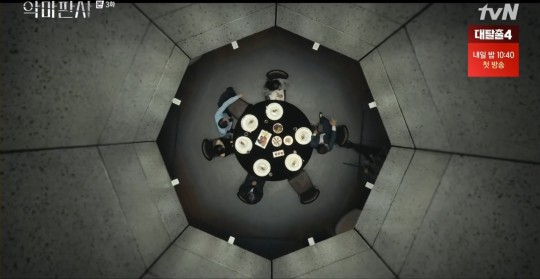
What's interesting about this? The seclusion and the enclosed feeling it conveys as a counterpart to the poverty shots we were just shown. Yet, these are the people making ads for a better future, what do they know?
They live comfortably behind concrete walls with no windows to see what goes on apart from the bubble they live in. This idea is further enforced at the party in episode 4, where they're not even a part of the donations, and watch and mock from afar as spectators. Yet, these people call the shots. They even call it commenting, as if they were watching the pain of others on TV.
The intriguing personality and the duality it encites
Now, this was a costume and wardrobe decision, but it was also very well thought of:
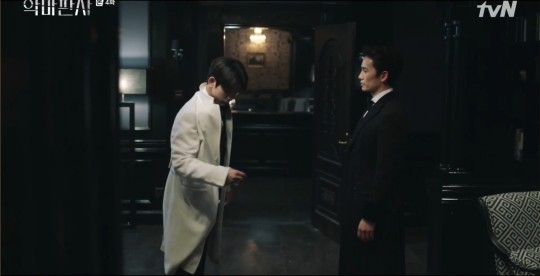
Judge Kim wears white and Judge Kang wears black. One is morally perceived by viewers of the show as morally good and the other is perceived as morally dubious at best. However, besides the costume and wardrobe thought put into this, we also have to think about the delivery of this scene and how it may further affect my detailing of this section. Judge Kang brings down the coats, and hangs over the coat to Judge Kim, he's the one who is making that annotation: You're pure, I'm tainted. This can have one of two interpretations:
Either Judge Kang believes Judge Kim to be pure and innocent due to his status as a rookie in the field
Or he believes Judge Kim to be morally white and himself morally black as he's looking at his brother's face and not at Judge Kim's heart.
Because most of the back story we're unveiling is through Judge Kim's perception, there's also an inherit bias we're having as well, because in Judge Kim narrative, he believes he's doing what's right and believes Judge Kang to be evil. In being served information about Judge Kang through Judge Kim's eyes, our bias is inherently skewed.
Another thing is that, when they put on the coat, they're standing in front of the other, as if the producers of this series are telling us they're two sides of the same coin.
The duality is made in more deceitful ways, which include:
A difference of classes that implies one has suffered while the other has not.
A difference of experience that implies one is more tainted while the other is pure.
A difference of age that implies one is a sly fox while the other one is is bunny about to be eaten.
A difference of temper that makes one erratic and the other logical.
Power dynamics
This one, in this one I could make a whole thesis based on just a couple of scenes in the drama. And you know I have to mention it: director Jung being the puppeteer.
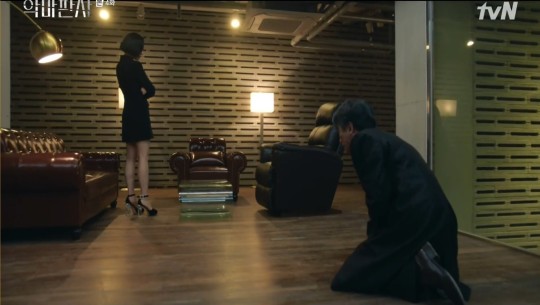
It may not be as unexpected at first, nevertheless it brings forward a lot of things I've wished to touch upon for quite some time now. A woman being a puppeteer of an old man in the portrayed dystopia that The Devil Judge is painting makes much more sense than more common demonstrations of these dynamics where it's either a:
A man of power being controlled by a bigger man of power.
A man of power being controlled by a seemingly man of a lower status.
A woman being controlled by a man of power.
Although, there's nothing wrong with those power dynamics, and if they were to be used, a message could also be conveyed, this one in particular works as a megaphone.
A subversion of power in such a way can be interpreted as a true indication of the weak overcoming the powerful. Why? It is not that woman are naturally weaker than men, but that in society, patriarchy has been a big factor in taking voice away from women in order to give it to men.
In order for Director Jung to achieve her purposes, it's smarter for her to do it under the pretense that an old rich man in power is the one calling the shots.
This is better exemplified by her stance when the old man tries to excuse his behavior, and what her moral compass is. I'm not saying I agree with her unethical conduct, but that her morality is directly impacted by the perception of the public of her as a weak woman:
Just because a dog bites a human does the person get dirty?
This is telling on how she perceives the actions of the old man in gropping the waitress. She didn't do anything wrong, even if you touched her, you are the dirty one.
While she's evil, it's a refreshing and deep evil.
The public's opinion and how there's actually logic in the show's portrayal
The public opinion can make or break a person, even if it's not on a public trial like this. While "cancel culture" barely works in today's society, a person's reputation is forever tainted. The show does tell that, but it also exhibits the scary downside of it, by showing how easily it was to make people accept flaggelation as a fitting punishment.
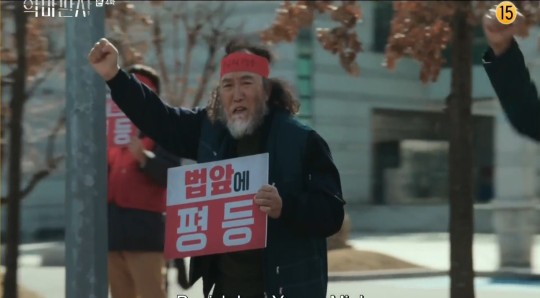
There are many experiments that have tried to test the effect of societal pressure on an individual's decision and the effect of the authority's enforcement of power in the outcome of these decisions. Furthermore, theories based on analysis of human behavior not necessarily relying on experiments can also help break this down. What do I mean? Here's a small attempt at explaining:
Milgram Experiment on Authority: which measured the individual willingness to carry out actions that go against their conscience due to an authority's approval.
Argument from Authority; The idea that people are more likely to use an authority's opinion on something as an argument for their reason. This is often seen in science, where trusted authorities have done the research and offer it to the public. In here, authority bias also plays a role, as we often believe, at first, that an authority must be right.
Moral disengagement: basically speaking, because this is evil or bad, I'm not part of it and I most probably am not actively participating in it. One may disengage by moral justification, which means that before engaging in something that has been previously perceived as immoral, I'm changing my stance on it based on what I tell myself to be logical arguments. This particular form of moral disengagement is very effective in changing the public opinion. I'll be touching on another form further down this post.
Other factors played a part, but these ones in particular came to mind when public flagelation as a form of corporeal punishment was wildly accepted. First, an authority is the one telling them it's correct, to go ahead. Secondly, another authority (the minister) had previously shown approval to such unusual punishment. Thirdly, they are not the ones to be engaging directly in the act, and even if they were, it would be acceptable because an authority has told them so. They may even believe the punishment to be a necessary evil for the greater good.
In fact, the minister's son was actually correct when pleading his case, they were accepting it because it wouldn't affect them directly.
Regarding the cinematographic descent of the public opinion regarding the situation can better be exemplified by the old man we've seen through the episodes.
Does suffering justify misdeeds?
Today I came along the difference between excuse and reason. You may give a reason for your behavior, but it doesn't excuse it.
Not because I've suffered through shit, means I have to make you suffer too.
I may explain myself, but it's on the other side to excuse me.
Why I hate the unreliable narrator and why I love it so much
This story has been told mostly through the eyes of Judge Kim and what he hears and sees regarding Judge Kang, if anything, the narrative is very close to that of the narrative we've seen in The Great Gatsby. An enigmatic man is being narrated to us from the eye of a man who hasn't known him for a long time.
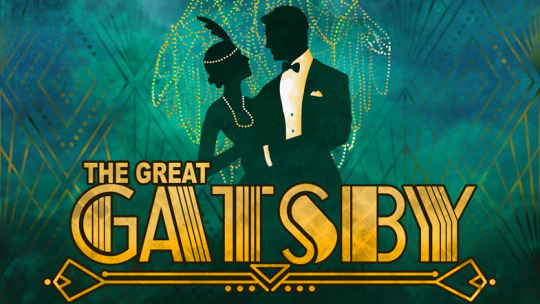
How is that an unreliable narrator? The narrator has their own set of bias and moral standards which function as lenses through which they see the world.
Another way of putting it would be the way teenage romances are often written in a first person narrative where either of the two teenagers is the narrator, so the author can sell to us something as simple as offering a pack of gum as the most romantic act on earth. We're perceiving interactions through rose tainted glasses.
In this case, we're seeing the interactions through Judge Kim's eyes who doesn't trust Judge Kang from the get go due to his own preset bias.
The narrative becomes even more unreliable as we're not exactly sure if what Judge Kang disclosed himself is a fact.
The reason why I love this narrative is because it leaves a lot of space to make simple plot twists to a narrative and make them seem grand, and can elongate a story without making it obvious.
The reason why I hate it is because sometimes, in tv shows mostly, we as viewers can see the other side of the story and grow increasingly frustrated with the main character's prejudice and misunderstandings (I'm looking at you my beloved Beyond Evil).
Also, because I have to wait for a long time before I actually have a clear picture of it.
#kdrama#kdramas#kdrama recommendations#analysis#rant#the devil judge#got7#park jinyoung#ji sung#kdrama meta#kdrama quotes#kdrama analysis#meta#the great gatsby#kim min jung#please dont let this flop
98 notes
·
View notes
Text
The Significance of Sunsets
We’re introduced to the significance of twilight during the Cannibalism Arc via the Tripartite Tactic.
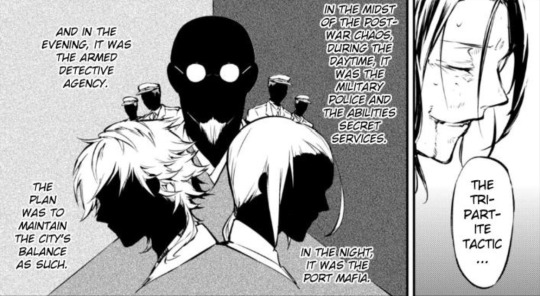
The essence of the Tripartite Tactic supports 3 core themes of BSD: moral ambiguity, the cyclical nature of life, and the beauty of humanity.
First, the Tripartite Tactic establishes the moral balance of the BSD universe through the government, PM, and ADA’s interactions with one another to ensure the balance of Yokohama.
Day and night are binary opposites, similar to how the government and mafia operate on opposite sides. That would imply that the government and mafia are always at war with one another, working to bring the other down, but the Tripartite Tactic suggests otherwise.
Both the government and mafia’s survival are necessary to secure the balance of the city, just like how day and night, good and evil have to coexist in a state of balance.
However, there is a middle ground that bridges these opposing concepts together: twilight — as represented with the agency.
As the evening acts the neutral point from day to night, the agency acts as a morally neutral organization between the government and mafia. They don’t necessarily abide by the laws and rules of “justice,” but they still work to establish a semblance of “good” in this world.
We’ve seen the government act in suspicious ways, we’ve seen the mafia act in good natured ways, and we’ve seen the agency do both of the sort. Even though the government and mafia are supposed to represent “good” and “evil”, the fact that they break these molds serves to once again prove the moral ambiguity within the BSD universe.
Twilight also symbolizes another important idea — the cyclical nature of life. As the passing period between day and night, it represents the end of a day, which will always lead to the start of a new day.
This cyclical nature lends itself to a feeling of hope that drives the journey of redemption — the hope that the night will pass and a new day will begin encourages our characters to persevere and hope for something better.
Cycles also show themselves through character interactions throughout the generations.
Mori abused Dazai → Dazai abused Akutagawa → Akutagawa abused Kyouka, In this case, the cycle of abuse is born (although it fortunately stops at Kyouka).
In parallel, Oda helped Dazai → Dazai helped Atsushi → Atsushi helps Kyouka, For this, the cycle of redemption is born.
As twilight is a time for sunsets, sunsets are an inevitable motif for these themes. The arrangement of colors in the sky, characteristic of a sunset, tends to evoke feelings of awe or admiration for the beauty of such sunset. The beauty of a sunset symbolizes an appreciation for the beauty of humanity, aligning with the theme of accepting human nature as is. (think Dazai)
Keeping in mind these 3 aspects: moral ambiguity, the cyclical nature of life, and the beauty of humanity, the significance of every scene with a sunset becomes more prominent.
Sunsets in BSD always appear at important points of the narrative, with my favorite being:
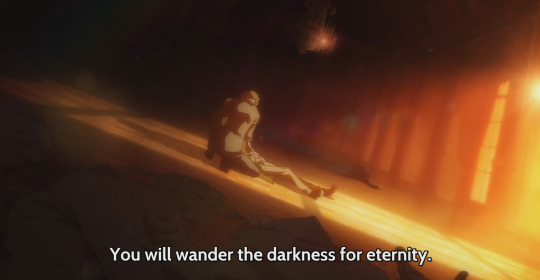
This scene’s significance is primarily Dazai’s transition out of the mafia as represented through the light shining through the window — as if light is being shined on the darkness that had surrounded his life.
This scene happens to be one of my favorites because it touches upon all three themes that the twilight-esque light represents.
Moral ambiguity: Oda knows that Dazai doesn’t care about justice or evil, or defining aspects of morality, so Oda argues Dazai should work for justice. Oda doesn’t try to argue that justice is morally correct, but he simply says it is “better” in an extremely vague way.
The idea of Dazai joining the side of justice with no strong moral conviction opens up the concept of moral ambiguity. Is it important for him to have a moral code if he wants to find the purpose of his life? Can he help others if he doesn’t believe it’s the “right” thing to do? Does it matter?
Most importantly, does saving others whilst not believing in the standards of morality place you within the boundaries of justice or evil? Or are there no such defined boundaries?
Cyclical nature: Oda pushes for Dazai to save people, instead of killing people, mirroring the actions of Natsume-sensei who helped Oda come to that same resolve. This starts the cycle of Dazai helping Atsushi, Atsushi helping Kyouka, and hopefully Atsushi getting to help Akutagawa as well.
This scene also reflects the idea of the “end of the night”, or the start of a new day as Dazai abandons the PM, and starts anew in the Agency.
Beauty of humanity: PM Dazai was arguably the most “inhumane” version of Dazai that we’ve seen, due to his heavily logic driven intellect and distrusting tendencies.
However, in this interaction with Oda, we finally see his humanity shine through. Oda gives no reasonable, straight-forward explanation as to why Dazai should leave the mafia, but Dazai follows his advice regardless because of their trust.
The ability to trust and love, an innate part of human nature, can be seen as foolish from the eyes of the logic-driven, but ultimately that’s what makes being human beautiful.
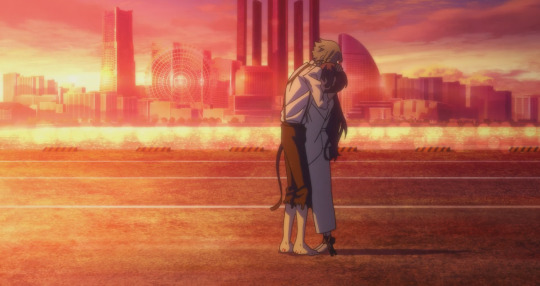
I admit the last scene may have been a little vague with whether the setting was actually a sunset, but this one is more obvious!
This takes place after SSKK’s fight with Francis, and they regroup with Dazai, Fukuzawa, and Kyouka.
Cyclical nature: As the finale of the Guild Arc, the sunset represents the end of a day and the start of another as they close this chapter of their lives. It also parallels Dazai’s “redemption” scene, as Kyouka finds her redemption in sacrificing herself for others and becoming part of the agency.
Just as Oda was able to help Dazai in the previous scene, Dazai is the one who tells Kyouka exactly what she needed to hear in order for her to survive and find a home in the agency.
Beauty of humanity: Being human means to be compassionate, and I’d argue that Kyouka was uncompassionate in the past, just because no one had shown her what compassion was like. However, Kyouka grows from that — with the help of Atsushi and Dazai showing her empathy and kindness, she’s able to reciprocate that feeling and be willing to give up her life for the sake of others.
Dazai also praises Akutagawa for a short moment in this scene, which is also an act of compassion from Dazai although Akutagawa deserves more than that.
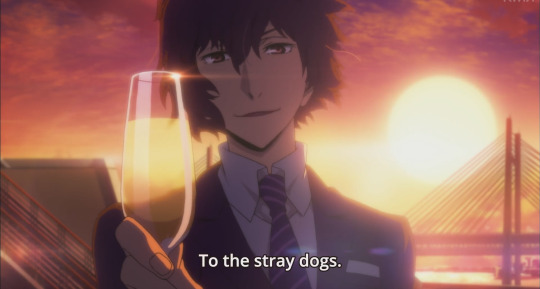
This scene follows the party at the end of the Cannibalism Arc, as Dazai and Atsushi have a nice heart-to-heart.
Dazai’s toast here is technically an anime-only moment, but obviously all of the sunsets are anime-only. Regardless, I’ll be discussing his entire talk with Atsushi here, along with the toast.
Moral ambiguity: Akutagawa’s promise to not kill anyone for 6 months mirrors that of Oda — a mafia member who doesn’t kill. By doing so, he directly challenges the morality involved with being a mafia member (what would be “bad”) and breaks away from the black and white labels of “good” and “evil.”
If we followed the code of justice, presumably the morally “right” way, then it would dictate that Akutagawa would need to be punished for the crimes he committed. However, Atsushi’s decision to form that promise with Akutagawa gives him an opportunity to grow and redeem himself, even if Akutagawa fits with the “evil” label.
Akutagawa and Atsushi are obviously foils — they’re different in almost every way, which you could use to define Atsushi as the hero and Akutagawa as the villain, but it’s undeniable that they also share many similarities. As the line between “good” and “evil” blurs, moral ambiguity is developed.
Cyclical nature: Once again, this scene closes out the Cannibalism Arc, with the sunset symbolizing both the end and beginning.
Atsushi’s promise with Akutagawa parallels that of Oda’s dying wish to Dazai; they’re both founded on the basis of trust, and they push towards a brighter future for Akutagawa and Dazai respectively. Thus, the cycle of redemption repeats itself once more.
Dazai’s “To the stray dogs” statement also parallels his toast with the Buraiha trio (Dazai, Ango, Oda). It could be just a callback to Oda, but it also expresses Dazai passing on the toast to Atsushi, from one stray dog to another. Nevertheless, this still represents a cycle of actions in which the previous generation affects the present.
Beauty of humanity: Dazai toasting to Atsushi with the phrase “stray dogs” offers a sense of compassion and hope. Dazai and Atsushi have undoubtedly grown closer to one another throughout the entire series up to this point, so it makes perfect sense that Dazai shows that he cares by sharing a piece of his past with Atsushi.
Toasting directly to the stray dogs implies a celebration of sorts for these dogs, who are stray but ultimately not alone. The toast is indicative of a hope for a better future whilst also acknowledging how one can feel lost in life (and how that’s okay).
Atsushi’s promise with Akutagawa also serves as an attempt to teach Akutagawa the beauty of humanity, since Atsushi believes that Akutagawa doesn’t see the value of life (which is preventing him from getting Dazai’s approval). I would argue that it should be the other way around, but Atsushi has good intentions here.
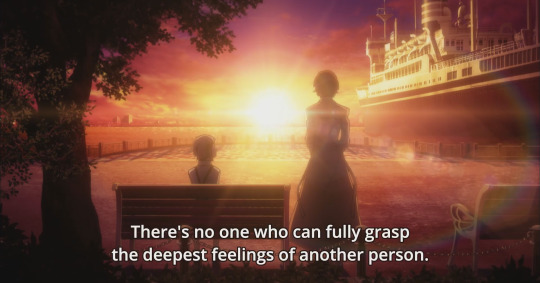
After Atsushi discovers the death of the Headmaster of his orphanage, Dazai gives some comforting advice.
Moral ambiguity: Atsushi struggles with his conflicted feelings towards the Headmaster’s death, which is perfectly understandable.
The Headmaster can’t be defined as completely good or completely bad, because he did impact Atsushi’s life in a way that led him to where he is today (once again, no definitive black or white answer as to whether that’s good or not).
Atsushi struggles with the thought that he has to pick whether to feel glad or upset, in order to fit within the neat labels of black and white, happy and sad. In response, Dazai (the definition of a morally ambiguous man) simply says:
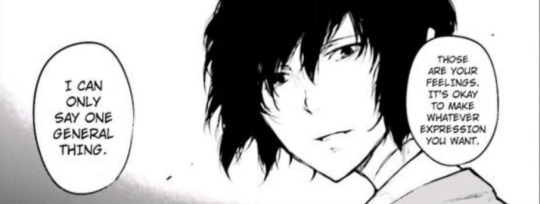
Although Dazai says “There’s no one who can fully grasp the deepest feelings of another person,” in the anime, I think the meaning of that is better stated in the manga. Dazai reasons that he can be both glad or upset, his feelings can be mixed, and there is no clear cut answer for how to feel (as Dazai only gives a general piece of advice).
Cyclical nature: Dazai’s statement, “when someone’s father dies, they tend to cry”, could honestly be interpreted in a multitude of ways.
Dazai’s reference to a father figure suggests that this “father” is simply a person who impacted their life greatly and made them who they are today. (since both of their fathers are unknown).
Following this definition, Oda is the father figure to Dazai in the same way that the Headmaster was to Atsushi. Although their methods of “helping” Dazai and Atsushi differ very drastically, the same cycle of this “father” figure impacting the life of their metaphorical son repeats.
Oda giving advice to Dazai, and Dazai giving advice to Atsushi is also another cycle — the cycle of reaching a hand out to someone in need. (which is the more sensical of these two conclusions)
Beauty of humanity: Dazai’s ability to be compassionate truly shines in this scene and shows just how much he’s grown from his time in the PM.
In contrary to PM Dazai’s unfeeling self, Dazai is able to empathize with Atsushi on a personal basis; just as the Headmaster was a integral part of Atsushi’s past, Oda was the same for Dazai.
Dazai’s growing ability to understand others demonstrates his willingness to grow more accustomed to human nature, and love it for what it is.
Atsushi’s confusion in dictating what he should feel also speaks on the nature of humanity; his feelings don’t have to make sense for him to feel them. In fact, the more illogical his emotions are, the more human he is.
#bsd#bungou stray dogs#bsd meta#bsd analysis#bsd dazai#bsd atsushi#bsd kyouka#just me gushing over how much i love sunsets#there are many more sunset scenes that i didnt cover hmmm
261 notes
·
View notes
Text
Trivia Tuesday

I decided to give you some details about Prey on the Heart since I have been planning this for about 11 months and I also researched the shit out of some of the details. Not that you’d guess it because almost none of that made it into the text itself so I wanted to put it out in the light.
- First of all, Violet. I mentioned that in the text but all hunting dogs including Violet are trained by Lysslis and they are conditioned how to behave. Valtor has been working on undoing some of Lysslis’ control over Violet but if it came to it, Lysslis could probably make her abandon him and side with her. Her grip on the dogs’ minds is that strong because otherwise Violet is the most loyal dog there is and would never abandon Valtor. Also, she’s had her shots against rabies so Griffin couldn’t catch anything from getting bitten. (Trust me, I was no fan of letting her get bitten and not get help after that but there was no way for it to happen. I needed their magic to be limited in some way (since they weren’t really supposed to have any but then the bracelets with obsidian happened and it was game over for my common sense.)
- About the magic in this AU (again, it was supposed to be just some rudiments in energy flows in the cosmos but my brain had other plans) - there is no Dragon Fire. Valtor’s fire magic is just that. The Ancestral Witches have their usual powers and they are after resources. Mainly, the resource of human lives since that can be used for unlimited purposes but they also don’t mind stealing other resources from other planets. However, the trick to that is that they need to know when and where portals to other planets will open and that only comes from deep knowledge about space and the energy currents in it. And that is where Griffin comes in.
- Obsidian is a planet with a lot of obsidian under its surface which makes it infertile and poor in resources since Obsidian is said to draw in negativity. As such it cleanses the rest of the universe but the planet itself suffers and that’s why it was never highly populated to begin with. The Ancestral Witches used that and bought a lot of the marked down land. They set up their mansion there and repopulated the barren forests with animals for them to hunt because they are just cruel like that. However, due to all the obsidian under the planet’s surface, their magic is subdued. Lysslis especially is not having a great time because obsidian is believed to block psychic attacks and so it affects her powers the most.
- And now for some general stuff on obsidian that kind of relates to my story. There are other colors of obsidian but I decided that black worked best for my story. Blades, statues, mirrors and jewelry can be made from obsidian and it’s also used in medicine since it’s better than surgical steel which that makes obsidian products is the main industry and main source of income for the planet. However, obsidian is easy to scratch, break or chip, which isn’t necessarily bad for the business since people will regularly need replacements. And now for some hilariously ironic (in the context of the story) properties of obsidian - it symbolizes purification, transformation, fulfillment, practicality, growth, exploration of the unknown (and enslaving the people from there apparently), new horizons. It enhances truth, acts as a shield against negativity, draws out mental stress or tension, clears confusion and provides clarity to the mind, helps you find who you truly are, dissolves emotional blockages and ancient traumas, promotes compassion and strengths, detoxifies, warms extremities (they really deep froze Griffin). Black obsidian specifically enforces self-control and facing your true self, gives strength and patience to overcome challenges, reigns in scattered energies, helps choose the path towards light and love. Also, obsidian is known as the stone of the spirit.
(This is a sketch of the obsidian belladonna I did way back when I first came up with the idea):

- The obsidian belladonna is something I made up as a species that is confined only to the planet of Obsidian. It is regular belladonna but with obsidian crystals running through the plants in black threads. They crystalize over the edges of the petals to form a thin, sharp black crust. It starts looking a lot like a shuriken but it’s a plant instead of metal. The obsidian crust is so fragile that it breaks when you cut yourself on it and that releases the poison directly in your veins. The obsidian threads run from the roots to the crust forming on the petals which is a problem because the root is the most poisonous part of the plant and that poison is now in the black crystal that just broke in your skin.
- Now the same for amethyst since I mentioned that island orbiting an uninhabited planet. I wasn’t originally going to include that but then I read up on amethyst and it happened. Amethyst is known as the Gem of Fire but at the same time is associated with February (aka winter aka snow and ice) and Neptune - the Roman god of the sea, which worked perfectly for me because I always compare Griffin’s temper to water. The name comes from the word ametusthos which means not intoxicated. Amethyst stimulates and soothes the mind and energies, is used to align planetary and astrological influences, controls evil thoughts, protects from treachery and surprise attacks as well as witchcraft and dark magic and disease and infection, brings victory, assists hunters, strengthens the thinking process and imagination and intuition, calms angry temperaments, gives meaning to relationships, heals skin, reduces pain and swellings. It is also known as the soul stone and symbolizes faithful love, energy of fire and passion, imagination, logic and emotion, self-esteem, self-knowledge. It brings comfort when grieving a lost loved one and a locket of amethyst can be used to call back lost love (guess what Girffin’s plan was there). It is known as the soul stone and is a fresh start crystal that is perfect for the researcher, scientist, explorer. It enhances efforts to change one’s situation and outlook on relationships (aka become a better spouse) and eases fear and guilt. It is also a seventeenth wedding anniversary gift which I found ironic because on the show Valtor spent seventeen years in Omega before returning.
#winx club#winx griffin#winx valtor#ancestral witches#prey on the heart#obsidian#amethyst#belladonna#trivia#trivia tuesday
10 notes
·
View notes
Text
When I started TNG, the biggest curiosity I had was why Dr. Pulaski was so hated. I heard plenty about why, but at the same time I wanted to see for myself and be able to draw my own conclusions. Well now that I’ve finished S2, I think that I can safely state my opinion and the reasons why she had such a bad reception.
My general opinion is… Pulaski’s fine, but she got an bad start. She’s a very competent doctor who is devoted to her duty. She’s a bit of a smartass, but otherwise a friendly enough person. She’s a VERY much based off a certain CMO form a certain other Star Trek show that came out before this one, but we’ll get to that later. Pulaski honestly had a lot working against her and she just wasn’t able to get over them despite her actress Diana Muldaur (who played Miranda Jones in TOS) doing an excelent acting job. It ultimately ended with Pulaski being dropped all together and Crusher returning in Season 3.
While I understand the hate against Pulaski and can’t say that it’s unwarranted to an extent, I think that a lot of it that I saw was overblown. Now if people disliked the character, that’s fine. Everyone has different tastes and reasons for what they like and dislike and should be free to have and express those thoughts. But a lot of the issues with her that I had were taken care of very early on and she became much better by the end of her tenure. So why do I believe that Pulaski ultimately failed? Well I’ve come up with three explanations based off my own observations from watching the show and what I got from fandom consensus. Now this is all my opinion based on those observations and is not objective fact whatsoever, so take this with a grain of salt. So I believe the reasons that Pulaski failed are:
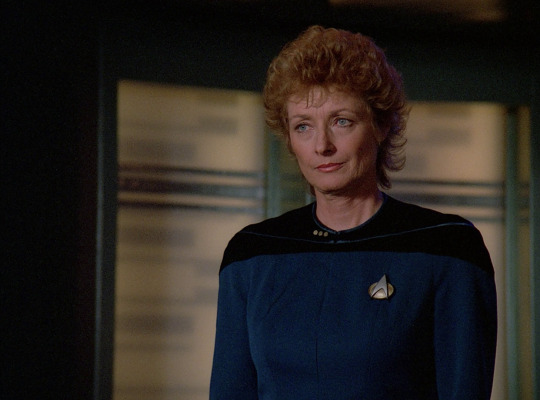
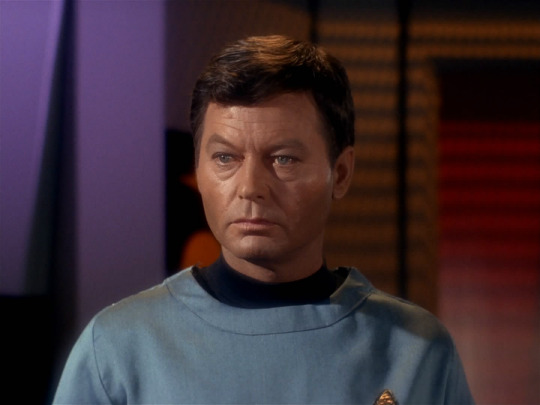
#1. She Is Essentially a Female Dr. McCoy… Sort Of: Pulaski was clearly heavily based on Dr. McCoy from TOS. She’s an middle-aged, somewhat world-weary doctor. She’s stubborn, grumpy, and doesn’t put up with anyone’s crap. She’s witty and always ready with a biting comment. She has the dedication to her job. She has the bantery relationship with the Science Officer, which we’ll go into that here soon. She is a doctor before she is an officer and that will always be her top priority, even at great risk to herself. She has a zero tolerance towards authority and isn’t afraid to talk back to anyone no matter how much they outrank her. She even outright has a hatred of teleporters that McCoy had. The parallels are all there. It may be why I’m a bit more lenient on her since McCoy is very much my favorite character in TOS and so far all of ST. But I think it is very much the root of the problem.
While Pulaski has several of McCoy’s traits, I think the writers really only understood McCoy on a surface level. They forget to include his compassion, his empathy, his humanism, his loyalty to the captain even when he opposes his actions, all of the things that make McCoy… well, McCoy. I don’t even know if the pacifism is there. Also McCoy had over 70 episodes of TOS and at that point five films (Undiscovered Country hadn’t been made yet). Pulaski had about 20 episodes and her relevance depended on the episode. McCoy had that as well, but he also had more material so we had FAR more time to get to know him. Pulaski didn’t get to have the time to gain that depth or care from the audience. Like… can I imagine Pulaski hypoing someone so that she can be tortured in their stead and it have the same impact that The Empath did? Can I see her counseling and assuring Picard if he’s having doubts like McCoy did for Kirk in The Ultimate Computer (okay tbf that would be Troi’s job but still)? Could I imagine any of the main cast being crushed about Pulaski dying of a terminal illness and choosing to stay on essentially a doomed spaceship with someone she just met and feel as gutted as I did in For the World is Hollow…? Honestly… given time maybe but in the end no. Now could I imagine McCoy risking getting an aging illness to possibly cure a child and others of it ala Unnatural Selection? Yes, albiet I think he’d be smart enough to bring protective equipment with him to be safe. Could I imagine McCoy telling someone like Data they’d be wrong to sit by a woman giving birth because he wasn’t human ala The Child? Hell no. Maybe he would if he was worried it would cause potential distress the one giving birth, but it sure as hell wouldn’t be because they’re an android. But I could imagine that someone who just saw McCoy as ‘grumpy doctor with a bad bedside manner who says witty lines and argues with the logical Vulcan character’ would get that interpretation. Thus why I think that Pulaski may have ended up how she did.
Now mind you I do think it IS a double standard to excuse McCoy’s dickish momemts and flaws, but demonize Pulaski for her’s. It’s like saying a man can be that way because it’s just expected of them and they can be forgiven, but a woman doing so or being assertice is wrong and they are horrible and unforgivable for having these traits or having flaws even if they correct them. That being said I do think that it’s more than that and it all comes down to the fact that TOS and TNG are two different shows with different character dynamics and ways of doing things. TOS mainly followed a Triumvirate (for the most part but that’s a different post entirely), TNG is much more of an ensemble. Pulaski didn’t have a Kirk nor a Spock to bounce off of or either let her traits shine or be kept in check like McCoy did nor did she really develop any unique relations for herself aside from maybe with Troi. We hear about her empathy and humanitarianism, but we don’t really see it on-screen like we did with McCoy. She has his surface level traits, not the deeper ones that the Triumvirate dynamic along his doctor position allowed him to showcase. In other words, Pulaski was put in a series that wasn’t designed for her while McCoy was exactly where he needed to be in order to thrive. It really speaks to how much the TNG writers didn’t really seem to get McCoy or why and how his character worked, which is strange since they got him right when he showed up in the series premiere. But maybe that was due to DeForest Kelley and him absolutely knowing the character he’d played for so long. But yeah they tried to replicate McCoy, and it just didn’t work with TNG’s already established character dynamics nor did they fully get the character that they were trying to recreate. If I want McCoy, I’ll go watch TOS or AOS. I didn’t need Pulaski for that.
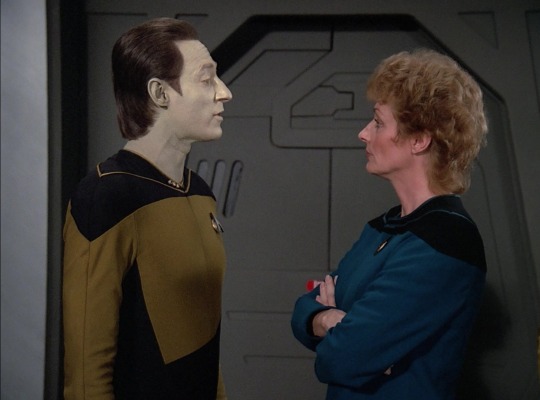
#2. Data and Misconstrued Character Dynamics; This is in relation to the first reason and REALLY shows how much the writers didn’t think the dynamics through. We all know how much Spock and McCoy bantered. How they are opposite ends of the spectrum and how their perspective points helped Kirk in making his decisions. Well clealry they wanted to re-create that with Pulaski and Data. Makes sense, Pulaski represents the humanism and Data the logical. But there’s one big, BIG problem with that: Data is NOT Spock. A lot fo people have pointed this out, but here’s the thing about Spock. Despite whatever he may have said, Spock DID have emotions. He kept them suppressed due to the issues in his upbringing and that wasn’t necessarily healthy, but he did have them. And despite speaking in a calm manner, he was also an utter sass bucket, could be rude, and had no issue putting down humanity if he had a point to make. He and McCoy were very much equal in their bantering and yes maybe McCoy could go too far with his insults, but there was always an equal balance and Spock was also perfectly capable of starting/escalating their spats. There were also plenty of moments to show that in spite of it, they were still friends and cared a great deal about each other with probably the best examples of this being The Immunity Syndrome, Bread and Circuses, The Empath, and plenty of moments in others like Miri and For the World is Hollow… Those who have been following me know how much I love the Spock/McCoy dynamic and I could go all day, but the point is it’s a complex relationship that may seem like disdain on the outside, but is so much more when you examine it up close.
Data however? Data is intelligent and the Science Officer with a calm demeanor, but that’s about where the similarity between him and Spock ends. Data is an android. I do not believe that he is emotionless, he just has a different wiring that causes him to feel things differently. He’s never shown disdain towards humanity at least from what I’ve observed thus far. If anything, he actively seeks to understand it and emotions more. He actively has hobbies like Sherlock Holmes. He tries things like sneezing and growing a beard in an effort to understand more. Data is more or less a child with a child-like understanding of things and he doesn’t really understand social cues or things like humor, but he DOES have emotions and feelings. There’s too much on-screen evidence to say otherwise. He just has his own way of processing it. This is what makes Pulaski look so bad. When she calls Data a machine, says he can’t understand, and even purposefully mispronounces his name, she comes across as an outright bully. She is essentially bullying a neurodivergent child. Do I need to explain why that’s awful? Data, while by no means a doormat, isn’t the type to sass back or make any biting comments back like Spock would. There is no balance. There is no equal footing. There are not enough positive interactions outside the banter to show that there is something deeper there at the end of the day like Spock and McCoy did. Heck you can even compare how Pulaski and McCoy talk to Data via McCoy’s guest appearance in Encounter at Farpoint. He DOES make a quip about Vulcans when talking to Data and when Data points out he’s an android not a Vulcan, McCoy mumbles “Just as bad.” But immediately after he gives Data genuine heartfelt advice on treating the Enterprise with care. It’s clear that ultimately it’s McCoy being his usual grumpy self who’d be acting the same way towards anyone else and is otherwise perfectly civil and encouraging to Data. We’ve known him long enough to know this. Pulaski didn’t have that luxury, coming off as condescending towards Data at best and considering that she’s a doctor, it looks especially bad.
Now to be fair this only lasts for about four episodes. Pulaski does start catching herself by her second episode, and stops completely after Unnatural Selection when Data helps her and stays with her after she gets the aging virus. After that she’s MUCH moe civil to him, even defending his choice going against the Prime Directive in Pen Pals and was at his retirement party in The Measure of a Man. But clearly the damage had been done. Data is a very beloved character and by Oulaski’s intro had already been established and well-liked character. Data was treated equally and was valued as far more than just an android among the rest of the crew, Crusher included, so Pulaski coming in a season later and acting that way also didn’t help. The writers did not think through why Spock and McCoy worked and how to try figure out a unique dynamic for Pulaski and Data. Instead they just tried to copy TOS, and it utterly failed. It ruined Pulaski’s chances before she could even really start running. But I do believe that she could have rebounded and as I said, she DID get past it. She did relapse some at the end of the season in Peak Performance to the point I wanna say that maybe it chronologically happened earlier in the season, but even then she felt realized her screw up and apologized. It’s still an improvement from early on. But things just weren’t meant to be, which leads is to…
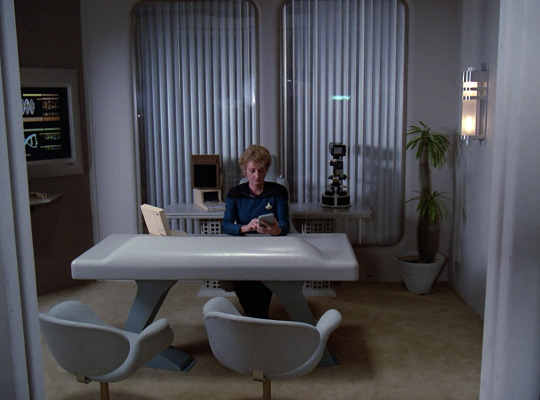
#3. She Only Lasted One Season/She Replaced Dr. Crusher: I believe that the biggest thing that worked against Pulaski is simple: she was cut after Season 2. Pulaski was created when Gates MacFadden left the show. I’ve seen conflicting reasons as to why, but regardless she left and a CMO was needed. IDK how popular Crusher was, but I had really enjoyed her. She was essentially the mom of the ship which added something different from TOS (wel McCoy was also the mom lets be real XD), had a son onboard which also added something new, was very much capable and devoted to her job, and was a badass when she got to use a phaser. Her being written out sucked, but that’s not necessarily a reason to hate Pulaski. But as I highlighted above, she just didn’t work. They tried to make McCoy, but without the dynamics and depth that let McCoy flourish. TNG is not TOS. Whenever TNG tried replicating TOS like with The Naked Now? It blew up in their faces. The key to a spinoff or reboot is to keep certain themes and tone alive, but to not just replicate what came before. TNG flourished when it began to find it’s own footing, and ultimately lasted four seasons longer than it’s predecessor due to it.
I genuinely believe that Pulaski COULD have developed into her own character and could have found her place the same way that McCoy did. But alas that didn’t happen. People wanted Crusher back, so they managed to get MacFadden to return and thus Crusher was put back in her rightful place. Because of it, Pulaski was just forgotten about. She didn’t get the chance to form her own character. She didn’t the chance to develop further and leave her early days behind. Why? Because she simply wasn’t given the opprotunity to do so. I can’t say it was the wrong choice, but it’s an utter shame because I do believe that Pulaski was on her way to improving. But it was too late. Her bad start with Data, her character not working in the TNG dynamic, and her replacing an already perfectly likeable character who did fit the dynamics all amounted to the character’s abrupt end. And because she didn’t get the chance to develop further and find her own path, her bad reputation has stuck to this very day.
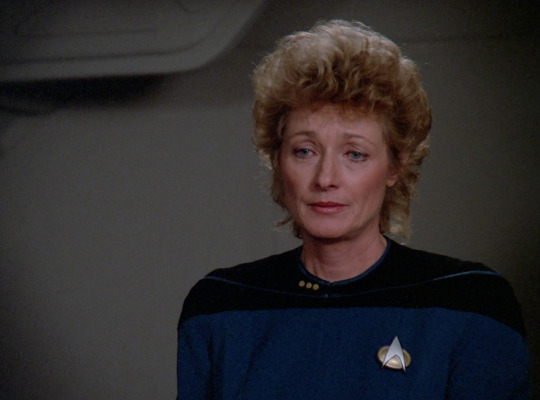
In the end, the whole thing just feels like a waste. Pulaski had potential, but it just didn’t work in the end. I can’t say that I hate her. If anything, I feel bad for her. The writers failed her at the end of the day and by the time they tried correcting their errors, the audience had already made their judgement. It may have been for the best to just drop her and bring Crusher back, but I also hate seeing character potential just so utterly wasted. I hope that if any side material used Pulaski, they were able to find a much better direction for her. I can’t say that I love Pulaski. In a more TOS-like setting maybe she’d have worked better. But in the end I think that Pulaski was a decent character who just had too much working against her and they caused her to crash and burn. Just an unfortunate case all in all.
(Image Source)
15 notes
·
View notes
Text
My Analysis of Mystery Incorporated and Hogwarts Houses
I want to start by saying that I don’t believe The Sorting Hat chooses your house based on your personality. There is no clear-cut definition to each house. Every one of us exhibits traits of all four of the houses. So I like to believe The Sorting Hat chooses your house based on your values. This is why entire wizarding families are in the same house - they have the same values, but they don’t necessarily have the same personalities. This is why classifying can be controversial. I don’t think there’s a right or wrong way to classify the gang because everyone has different interpretations of them depending on what they’ve read/watched. This is my take where I explore some different perspectives, so hear me out :)
Fred.
I feel like this is going to be smallest discussion by far because there’s literally nothing to discuss; Fred is a Gryffindor through and through. He’s the textbook definition of brave, he’s a do-er and he has a strong moral compass and sense of justice. He can be a little bit reckless and heroic, and I definitely see Harry’s personality within Fred’s. The only other house I’d possibly consider for him is Hufflepuff because he has a heart of gold and is so loyally devoted to his friends. But his competitive nature and tendency to act without thinking make him far more suited to...
GRYFFINDOR !
Daphne.
Looking at all the Scooby Gang in Hogwarts interpretations online, I have discovered that Daphne is the most controversial. I’ve seen her portrayed as all four, but I think there’s definitely more of a case for Slytherin and Gryffindor. For starters, while Daphne is very smart, she isn’t the type to think before acting, and she isn’t always logical (she’s a firm believer in the supernatural in many series). So she isn’t Ravenclaw, but what about Hufflepuff? I think Hufflepuff fits her, but she also has other qualities that are better exhibited in the more ‘extroverted’ houses, so to speak. Just like Fred, Daphne is far too competitive and ambitious to be a true Hufflepuff.
Something that a lot of people miss about Daphne’s character, particularly if you’ve only watched the older series, is her bravery. She can be heroic too, and as Scooby Apocalypse showed us, she can be a fierce leader too. An argument for Daphne being Gryffindor over Slytherin is that she is more passionate than reasonable. In my opinion, Gryffindors tend to be guided by their passion, whereas Slytherins are driven by their reason. At first glance, she may look like a Gryffindor because of her confidence and sense of adventure. But I think there are a couple of key reasons as to why she is not a Gryffindor.
To decipher the problem as to why she is not a Gryffindor, I simply compared her to Fred. She has a tough exterior, but I think inside, she is vulnerable and afraid of rejection and perhaps, at times, uncertain of her morals. This wavers from the fundamental definition of a Gryffindor.
Daphne likes to get her own way, and uses a variety of means to get it, whether it be her looks or smarts. That leads on to another thing - I just think she’s too smart for Gryffindor. Of course, you can have smart Gryffindors (hello Hermione), but she’s a different sort of smart. Hermione is book smart, but Daphne is more street smart. In that sense, she can also be manipulative and does have the potential to use this to her own advantage, whether it be good or bad. I believe that Daphne’s influential capacity makes her different from a Gryffindor, who has a strong sense of justice. She also highly values her reputation and appearance. In many incarnations, Daphne has been shown to be extremely resourceful and quick-witted. Gryffindors are more socially orientated and tend to do things for the ‘greater good’, governed by their own morality. Slytherins on the other hand, are more individually focused and I definitely think many of Daphne’s actions are for her own individual sense of self satisfaction. For all these reasons, Daphne is a...
SLYTHERIN !
Velma.
Okay, so the obvious thing here would be to say she’s a Ravenclaw because she’s smart. But there’s so much more to Velma than being ‘smart’ and Ravenclaws value more than just intelligence. Also remember there are people in Gryffindor, Slytherin and Hufflepuff who are highly intelligent.
Let’s do this by a process of elimination. First off, she’s not a Hufflepuff. I see Hufflepuffs as affectionate, caring people, and while Velma has an undeniable loyalty to her friends and family, she’s not open about it. Hufflepuffs are fair and modest people, but Velma never misses an opportunity to outshine a rival with her wits.
Gryffindor. *exhales* Velma is a brave person, but she’s not recklessly brave. You may argue that Velma is similar to Hermione, but I think the key thing that differentiates them is their thought process. Hermione is more of a doer, and has little time for planning, whereas Velma likes having a plan, especially during a trap. There are many episodes throughout the franchise where she gets frustrated with Fred’s lack of plan. This is Fred’s Gryffindor shining through, and I think in moments like these, the difference between their values becomes plain.
You may think by now that I’m pushing Velma towards Ravenclaw, especially since it’s clearly Hermione’s secondary house. Consider Slytherin. This is an interesting debate - in my opinion, Slytherin and Ravenclaw are the generally the smartest houses, and I can see Velma in both of them.
Overall, I think she is a Ravenclaw. This is because she has a constantly active mind and a love of learning and books. The defining trait of a Ravenclaw is their confidence in their own knowledge. Without a doubt, Velma has this to the point where she actually comes across as arrogant and a know-it-all. And she is probably the most introverted and independent character in the gang.
But I also want to present the lesser discussed notion of Velma being a Slytherin.
Velma is a detective with an incredible ability to read and understand the criminal mind. This in itself makes her a clever, calculating person, which are qualities of Slytherin. She is also ambitious and highly competitive, especially in the academic world. And she has a small group of close friends who she is very loyal to. Remember that SDMI episode where she hacks the monster biker’s computer to save Scooby’s life? *loyalty* I also think she demands a certain level of respect from the people that she meets. She wants to project herself as a smart, capable person and she gives me the feeling that first impressions matter to her.
As for the distinction between Ravenclaw and Slytherin, I think the key thing is this: Ravenclaws are both logical and abstract thinkers who think outside the box. Ravenclaw Luna Lovegood gave such insightful answers to enter the Ravenclaw common room, eg, a circle has no end or beginning. I just don’t think Velma is an abstract thinker. She’s a very practical person who likes to be in control of the facts of the mysteries. She freaks out whenever something is slightly off, like that BCSD episode when she got so caught up on why the monster was a Yeti instead of actually solving the mystery. In my opinion, Slytherins are more practical minded, they can have a nasty streak and they’re highly self reliant. Oh, and Velma is a sarcastic QUEEN.
In conclusion, Velma could easily be in Slytherin or Ravenclaw. I think she has elements of Slytherin (especially in SDMI), but at heart, I declare Velma to be...
RAVENCLAW !
Shaggy and Scooby.
The go-to for our iconic duo is Hufflepuff. They’re obviously not Slytherin or Ravenclaw (if you need further convincing, read Velma’s section above), but Gryffindor isn’t completely out of the question. Perhaps the polar opposites of primary and secondary houses is why Shelma, in my opinion, are incompatible.
It is widely known and played upon in all of Scooby Doo how cowardly Shaggy and Scooby are. But like, they’re not??? Their courage is seriously overlooked. They’re always placed in the most dangerous positions, and that requires a lot of bravery to overcome. They’re often the heroes who save their friends. If they were placed in Gryffindor, I’d see them as being very similar to Neville Longbottom.
But there are a few reasons as to why they are not true Gryffindors, and are, in fact, Hufflepuffs. Shaggy and Scooby are not at all competitive (where it matters - excluding sports or races) or tempered in nature. They hate conflict, and Shaggy is often the mediator between the gang’s arguments.
They are Hufflepuffs because of their loyalty, fairness and open-mindedness. Just like Cedric Diggory in the Triwizard Tournament who suggests Harry takes the cup, Shaggy and Scooby value people over individual glory. Shaggy is a very inclusive person and obviously an animal lover. Also, they obviously love to eat. There is a reason why the Hufflepuff common room is right beside the kitchens, and if Shaggy and Scooby got wind of this, they wouldn’t give the other houses a thought. So without further discussion...
HUFFLEPUFF !
Me!!!
I got Gryffindor in Pottermore but my values and personality are more suited to Ravenclaw. If I had to choose, I’d say RAVENCLAW, but my hybrid house feels the most accurate for me and it’s GRIFFINCLAW !!!
Anyway, I hope I sparked up some new thoughts/perspectives you hadn’t considered before.
What house are you?
#me: disappears for a week then comes back with this#ESSAY#hogwarts#gryffindor#slytherin#ravenclaw#hufflepuff#griffinclaw#hogwarts houses#harry potter#scooby doo#fred#daphne#velma#shaggy
24 notes
·
View notes
Text
Homestuck - Heart and Mind
Inner self and outer self
Content/trigger warnings:
Heart: blood, decapitated heads, flashing colors, eye strain
Mind: flashing lights, repetitive looped gif
Very veeeery long thread!

Heart
I’m going to be honest, this is the more head-scratching (ha!) symbol of the 12, in my opinion. While the others immediately (or take a moment to) make sense, this one confuse me. Sure, it’s a cartoonish representation of a pink human heart.
The problem isn’t the main shape, but the right side of it. Beside the fact that it’s more original and eye-catching than a filled heart, why this gap, this wiggling line? But let’s proceed in order and take a more general approach first.
It’s a pink heart on a darker purple/pink background. The left side is filled, while the right side looks like a tail that coming in or out the shape. We’ll get into it a bit down below.
In pop and universal culture, people has always been show this embodiment of the heart. While many theorise about when and where it came from, a stable origin was registered during the Middle Age, as a pear.
Here’s an exempt of the theory:
“Historically speaking, the first known depiction of a heart shape, which can be vaguely considered as a symbol of love, was made in the 1250s. It appeared in a decoration of a capital letter “S” in a manuscript of a French romance called “Roman de la Poire” (Romance of the Pear).
This miniature depicts a kneeling lover who offers his heart to a lady. This heart shape is similar to a pine cone, and it is held upside down (not in the usual position of the heart shape that we know today). Researchers only assume that the pine cone-shaped object is a heart because its part held by the lover is hidden. The name of this novel is “Romance of the Pear,” so the object may also be a pear.”
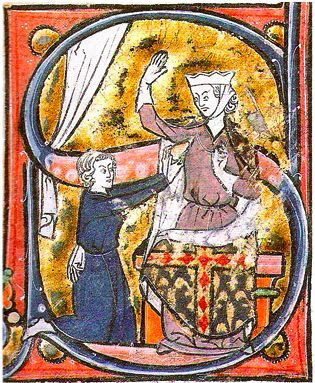
The earliest depiction of a heart symbol as a symbol of love in a manuscript of the “Roman de la Poire.”
[Mio’s note: Roman actually means novel in french, and isn’t necessarily romantic. Though I guess it is in this context.]
It is interesting, in this paragraph the heart is both referred as pine cone-shaped and pear-shaped.
The latter is extremely funny, has it reminds me of a famous fanon HS meme “Well this has gone completely fucking pear-shaped”, attributed to Dirk and the decapitation joke. He, in fact, never really said it in Canon.
If we indulge this banter, the pear-shaped heart would symbolise things that took a disastrous turn, and so negative and stressful elements such as anxiety, adrenaline (negative in this case, positive in others), heart pounding, leaving a weird and unpleasant sandy taste on your tongue.

But I digress.
What we actually need to focus on is that:
A fruit, the pear, has been associated to a love gesture, like a gift to express romantic affection to someone.
The pear is upside-down, as the text point out. Which is curious and worth mentioning.
“the pine cone-shaped object is a heart because its part held by the lover is hidden”. So what is important it’s what is inside it, and so inside your heart. Which perfectly echoes with my subhead: Inner self.
The article continues, with Guido whom also depicted his version of a heart:
“Guido da Vigevano, a 14th-century Italian physicist, made some anatomical drawings of a heart that are very similar to the descriptions made by Aristotle. These depictions, along with the presumption that the human heart is connected with emotion and pleasure, transformed the heart shape into a symbol of medieval love.”
After this, a picture shows Charity incarnated as a woman, giving her heart to Jesus. While I won’t dwell on the religious implications, it is a metaphor of showing care and compassion to someone. Giving them a bit of your time, patience, and heart. In an extreme case, being completely devoted to someone in a strong way.
Heart-bound fellows, despite the fact that they are concerned about themselves, are very people-oriented. They deeply want others to feel well and happy. Hence the expression being ‘kind-hearted/big-hearted’, and ‘work you heart out’. They put a lot of themselves into their hobbies, which they are passionate about.
After this, the article introduce the playing cards, implying that Guido had an influence on the decision to show a heart among the symbols:
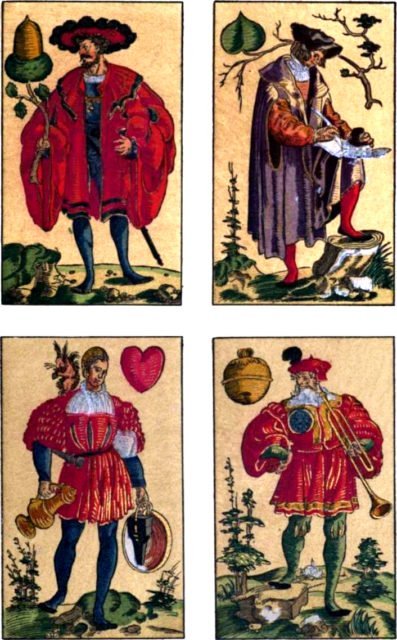
The playing cards are even more relevant to this analysis, as their modern symbol are present in Troll romance. Here, the ‘clover’ is an acorn, the ‘spade’ a leaf, perhaps ivy, the heart is even more like the one we know nowadays, and the ‘diamond’ surprisingly is a small metallic bell. This set is dated from ~1540.
[Sources: this site about the origins of the red heart]
That was a (very) quick look at the evolution of the heart symbol.
I could go on and talk about Valentine’s Day, but it would be paraphrasing the site, and we have much more content to focus on. I invite you to take a look at said site and do some research of your own if you are interested about this peculiar bit.
Let’s go into more direct Homestuck content.
During the adventure, we are introduced to three Heart-players. Nepeta Leijon, Dirk Strider, and Meulin Leijon, in appearance order.
They all have interests related to feelings and love.
Nepeta has a shipping grid of her own friends on her cave’s walls and seems to be proficient in moirallegiance, a quadrant that require to be invested and devoted to their partner feelings. She had a crush on Karkat that she never confessed. Karkat knew but never worked the nerve to do something about it.

Dirk is engrossed by romance and smut, unashamedly draw his friends getting frisky (in a borderline-obscene way), is passionate about the projects he works on (work his heart out, sometimes literally). He was (and still is) madly in love with Jake. But by being overbearing and socially inept their relationship crumbled (while not being the only reason it didn’t work out).
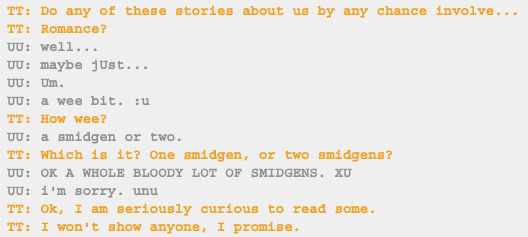
[I love talking about Dirk, but I’ll do my best in this analysis to properly and equally split the content between Nepeta, Meulin and him]
Meulin not only love shipping, she also gives directly advises to her friends, and acted as a matchmaker. She shipped several of the alpha trolls but according to Aranea, she focused on how cute a couple would be, instead on how and if their dynamic would work out. Her matespritship with Kurloz was cut short when he yelled in his sleep, deafening Meulin in the process.

Meulin talking about shipping the human teens, transcript from the Openbound game, part 2
The most obvious element they share is that they are zealous and unlucky in love. One would say it depends on the class, personality or aspect. They seem all correct assumptions to me.
Nepeta was the first to be presented as a Heart-bound character, the Rogue of Heart. So, logically, the design of the Heart symbol could be inspired by her.
How, you ask. Let’s take a look to Nepeta’s sign.

The ‘Leo’ sign, in human culture represents the constellation of the lion, with the circle as their head, and the loop as the body and tail.
Now looking back and forth to Leo and Heart: Heeeey! It’s quite similar. Can you see it?

Alright, that’s a good start. So the right side is like a tail. Let’s dig and look around Heart/heart. Heart is synonym of soul. Its symbol is a pink blood pusher. For humans it represent romantic love, our only ‘official’ quadrant. A red lover for trolls is called a matesprit. Sprit comes from esprit, which is the french word for spirit. So matesprit is a soul mate. But this term is used for another concept in Homestuck. A spiritual guide during the player journey: a sprite.


The link between the Leo and Heart sign is getting stronger. The circle as the head, the wiggling line as the body and tail. The sprite is a living spirit, a floating soul present in the physical plane. So the right side, the tail, is bound to the left side, the head. Meaning the soul is bound to the body.
Oh. But what if it was detached from it? Yeeep, you know, I know, they know. This is why and how decapitation come into the picture.
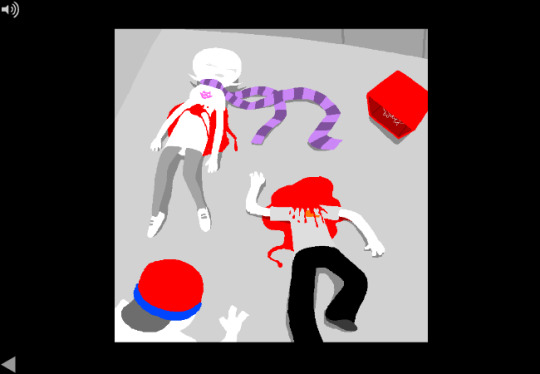
Beheaded Dirk and Roxy hit in the stomach, from the [S] Dirk: synchronize

Jasperosesprite^2 prototyping Nepeta’s decapitated head in Jake’s kernelsprite
A kiss on the lips, which is seen often as a romantic gesture, is one of the resurrecting mechanism within SBURB/SGRUB. It transfers the soul from the ‘original’ body to the dream self, turning the latter into the main body. Separating the head from the rest of the body amounts to take away the soul, while throwing the head back (or any part of the corpse) into a kernelsprite recreate the link between the two.
A kernel is:
“ a computer program at the core of a computer's operation system with complete control over everything in the system. It is an integral part of any operating system. It is the "portion of the operating system code that is always resident in memory". It facilitates interactions between hardware and software components.””
Source: Wikipedia
It’s a brain that bound the soul to the body, and is the core of the system, controlling it. So basically, the digital mind made in SBURB. One display among the several ones of the Heart/Mind duality.
So wait, if the head in this case is the soul, and looking back at medieval picture at the beginning (dude kneeling in front of a lady offering a heart) then Dirk sendificating his head in [S] Dirk Synchronize/Unite is really a romantic overture toward Jake (sacrificing a part of his self then Hal prompting him to kiss Dirk’s lips). Same for Jasperose resurrecting Nepeta by using her head. Damn. You two are smooth operators in the most disturbing way.
Another personal theory in my mind, is that pink ‘tail’ could represent how a person use and interact with their aspect.
Nepeta, as a Rogue, remove or give personality, passion and feelings to someone.
For example she could appease a friend by removing their frustration. In contrary she could also give passionate feelings to someone who needs them. Such as in Ni no Kuni! In which the protagonist Oliver takes a piece of somebody’s soul (what is called emotion or virtue) to give it to someone who needs it. Those people are referred to “brokenhearted”.
So the wiggling tail would be something introduced or take away from the soul.
Dirk, as a Prince, has shown having the power to completely remove someone’s soul from their body.
And for that, he doesn’t like his abilities, exhibiting him as a ‘cartoonish villain’ like Voldemort (splintering his soul into horcruxes) or Xehanort (putting part of himself in the Organization members). Though he could remove and grab one of his friend’s soul to save them from a close death. See the fan comic Double Death of the Author by The Lifetime Channel on MSPFA, and the fan fiction Defragmentation by Katreal on Ao3.
In this case, the tail would represent the soul being slowly removed.
Meulin, as a Mage, have an understanding of people’s strong feelings, especially romantic ones.
Her ability is to read, feel and use her knowledge to help her friends figure out who is better suited for them. Meulin’s powers are similar to a diviner, allowing to form or break a couple. Perhaps with practice and reaching the God Tiers, she could even perceive red threads of fate which bound two lovers regardless of the location and time. The manga Bound Beauty (sorry, no english Wikipedia page) features a young lady with the ability to see those strings, usually invisible to the eye. She uses it at her advantage to coach her classmates, in exchange of money.
In this case, the tail would represent the red/pink thread of fate, coming not from the pinkie, but directly from the soul.
Heart-bound recommended Lyricstuck: What do you want from me by Pink Floyd

Mind
Watch as I make as much Mind puns as possible :p
This one is easier to read, which is also why it will be difficult for me to write a substantial section about it. Let’s start with the obvious.
It’s a vivid teal on a bit darker green background. Same as the Heart aspect, it’s more likely that the palette has been inspired by the first revealed character related to Mind: Terezi Pyrope, from the Teal caste. The shape is composed of an orb surrounded by three hook-like tails connected to the center. What effortlessly come to mind (ha!) is an organic cell, from the brain.
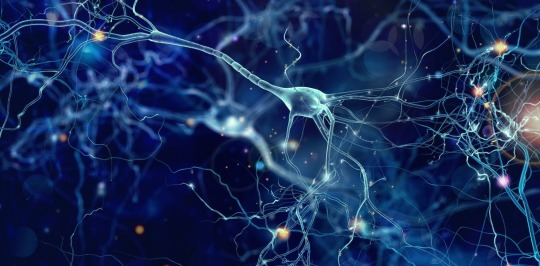
Picture source: https://www.pinterest.fr/pin/784048616363923971/
Neurons allow and facilitate informations to navigate in the brain.
It’s:
an electrically excitable cell that communicates with other cells via specialized connections called synapses.
Source: Wikipedia
Information goes from a neuron, through a synapse to another neuron. An idea leads to another, connecting bits that turns into the big picture.
The Mind aspect seems to share the concept of data with the Light aspect. The differences are that Light focuses on the most fructuous parts, ones that lead them to victory, while the Mind-bound works with choices and a mindset, in a more wide range, then narrowing the paths.
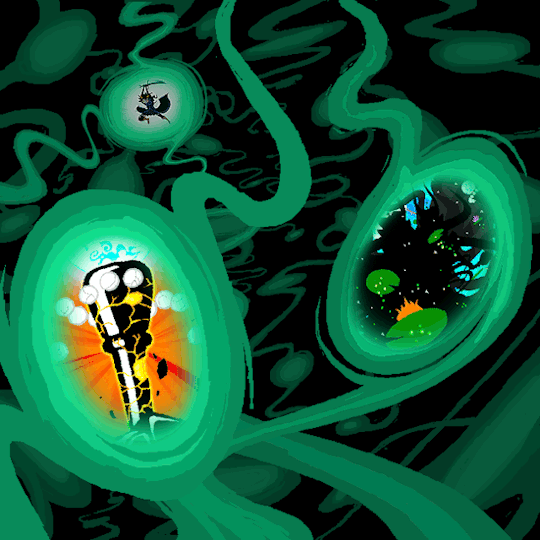
Terezi using her vision to s33 what action leads to which outcome, searching for the most fitting one.

Rose insisting that Kanaya come along the 3 years ride, while explaining and guiding Kanaya to make her narrowing her vision of “victory”.
So both Seer treat information, just not in the same way.
The outcome still remains ”I want to advance toward a certain reality and I help others to reach it as long as they follow my instructions”. The inconvenient blind spot (sorry for the involuntary pun) is that they hardly can use those abilities for themselves. Either we don’t witness it on-screen, or they barely do it in the first place (a good example is the retroactive continuity during the GO timeline).
But let’s end the Seer detour here. Back to the Mind aspect itself.
We have a whole system going on in our own head. When I try to look for something, if I don’t find it directly, then I turn to something related to said information. Like an indirect research on the internet. If we don’t pay attention and don’t try to understanding our mind, as well as others’, we just end up being frustrated and lost.

The thing is you make your own world, with every action, decision, it creates a new path full of possibilities. The words you say or keep to yourself, acting or staying put, it all matter. Grasping and managing to own it, and you’ll have a better grip on your reality. It’s not my Aspect, I do have trouble making decisions and take responsibilities, however everybody needs to go through it.
The within interacts with the without, the mind to the outside word. We are always worried about how others perceive us, what kind of depiction of the self we convey. So we desperately put filters to the point of exhibiting falsehood of a personality. While introspection is observing ourselves, extraspection is perceiving things that are outside our mind. Hence the outer self, complementary to the inner self.
Terezi perfectly get how people work, and can manipulate them with ease, in contrary to Vriska whom doesn’t want to and go for mind-controlling them. Joke’s on her, her ‘mind’-control is proof that she fails in this peculiar category, since Terezi doesn’t need any psychic powers to convince someone to do and give the info she desires.
The big contrast contrast between Vriska and her, is that Terezi looks and determine what matters or not, while Vriska force the odds to be in her favor, shamelessly stealing fortune from others. She doesn’t even want to understand or try, she is a cheater and proud of it.
That was the link and differences between Mind and Light.
Let’s take a look at the Heart/Mind duality again. Both seem to share a connection with electricity.
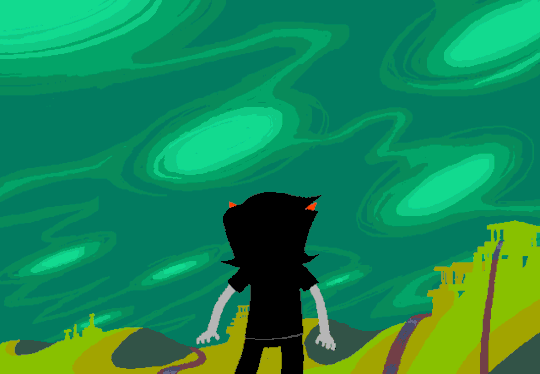
Terezi gazing at the sky of her planet, the Land of Thought and Flow
It’s no secret that the connection between neurons are often compared to electronic chips. Cables canalize and facilitate electricity’s flow, to power devices, to link ideas and data. Or just used as raw energy.
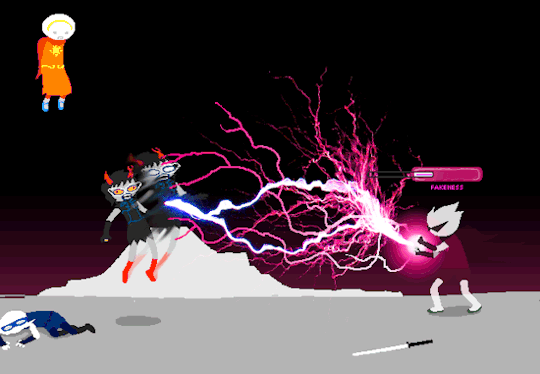
Brain-not-so-ghost-anymore Dirk trying to rip Aranea’s soul

Lightning seen from a building roof on Dirk’s land
While the electricity for the Mind symbol refer to synapses, for the Heart/heart, also called blood pusher, would allude to cardiac nerves.
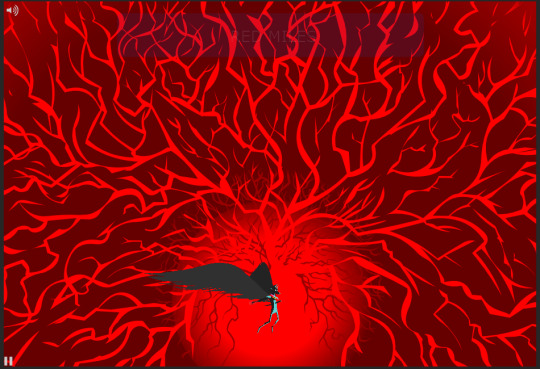
Bec Noir preparing the Red Miles to be thrown at the Genesis Frog
Instead of thoughts, it’s blood that navigates in the ‘roads’.
For the Heart-bound, the lightning represents the chaos that are emotions and sensitive intuition. While for the Mind-bound the lightning is order, reasoning and cold logic that strikes to bring justice, whether said justice is deem fair or not.
Let’s talk about a famous movies series in which among the core themes resolve around the Mind/Heart duality: The Matrix
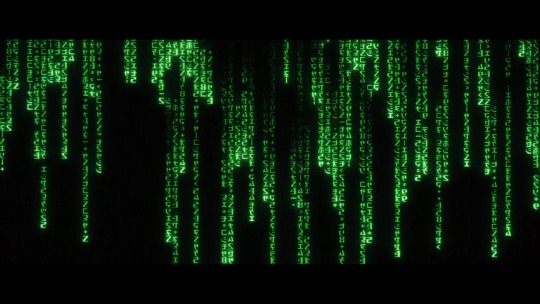
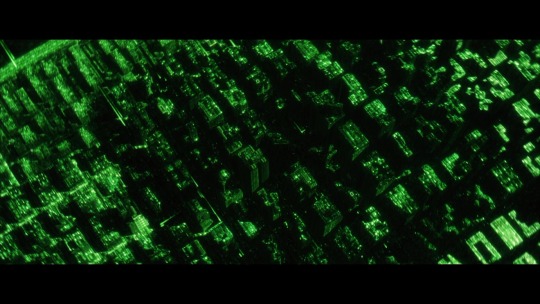
Each building, tree, person are made with an inimaginable amount of lines of code
The Matrix spoilers ahead!!
If you’re not familiar with this trilogy (or haven’t watch it in a while), here’s the plot:
//Thomas A. Anderson is a programmer for a big software company, and in parallel is Neo, a hacker that illegally provides contraband programming.
Agents in black suits caught up with his activities, but in truth approached Neo because a renowned hacker, Morpheus, enemy number one according to Agent Smith, contacted the programmer.
After offering to clean his criminal record in exchange of helping catching Morpheus, which Neo refuses, the agents violently implant a snitch in our protagonist.
Neo wake up in his bed, believing it was all but an awful nightmare. Appearances are deceiving, as ‘dream sequences’ are layers on layers on reality. The resistance group calls him again, setting a rendez-vous under a bridge to help him and answer his questions, if he is willing to cooperate.
After a lot of hesitation, snitch removal, and the insistence of one of the member, Trinity, he finally accept and follow the group to go meet Morpheus.
There, Neo is given a choice, The Choice if we’re going with Homestuck comparisons:
"This is your last chance. After this, there is no turning back. You take the blue pill—the story ends, you wake up in your bed and believe whatever you want to believe. You take the red pill—you stay in Wonderland and I show you how deep the rabbit-hole goes."
Morpheus, Matrix (1st movie)
By choosing the take the red pill, Neo accepts to unplug himself (literally) from his ‘reality’ and see the truth: the world he lives in is all but an illusion, a huge program that is the Matrix, blinding humans to a make-believe 1999 year, used as living batteries, harvested and enslaved by the machines. Humanity is in ruins, and a war between people and machines has gone for a whole century.
Morpheus tells him that they believe he’s ‘The One’ and he has the power to stop the war. From the real world, Neo will train to reinforce his mind, going back into the Matrix and fight different enemy programs. While constantly being undergo introspection, looking for what to believe, who he is, questioning his values and acts.\\
From there I’ll go back and worth to Homestuck and the movies to point out the similarities and support my choice.
I’ll begin with the Mind aspect first:
Millions of human beings are plugged, treated as programs that have a function, along with providing a great amount of energy to the machines. Stuck and having their body atrophied, their brain is connected to the Matrix. The program control everything of their life and vision, from their status in society, to their physical sensations.
"What is real? How do you define real?" asks Morpheus to Neo. “If real is what you can feel, smell, taste and see, then real is simply electrical signals interpreted by your brain." As I quote farther above, reality is something that isn’t there, but rather something you make. With Morpheus’ quote, my interpretation of the Mind symbol being neutrons and synapses is consolidated.
After being blinded by Vriska, Terezi way of ‘seeing’ shifted. Slowly, her perception of things changed and she grasped on a new light her reality.
She didn’t need eyes, but expanding her mind and freeing herself from the vision that clouded her. Navigating inward and outward, understanding what she felt, her inner self and outer self, back and forth. But it wasn’t perfect, no, she had and still is working on it, as she can be blinded by either cold logic or passionate feelings.
Neo and her have the same weakness, they both are in love and it obstructs their mission. The dilemma is exhibited in [S]: Flip, where she has to choose between letting Vriska go, exposing the whole team to Jack, or killing her to protect her friends.

Terezi, on the path she let Vriska go
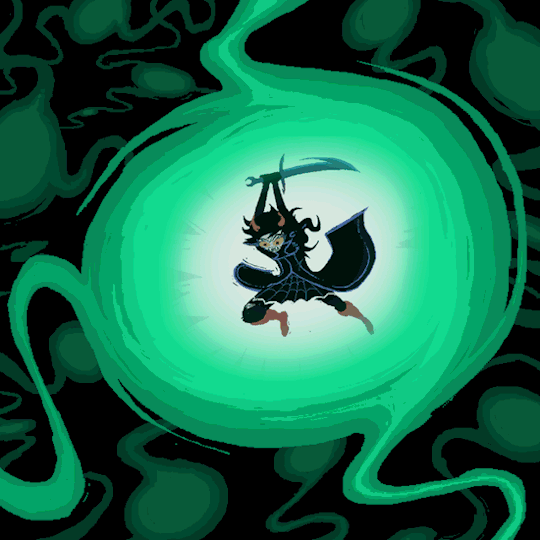
Vriska in her ancestor outfit, fitting Jack in one reality
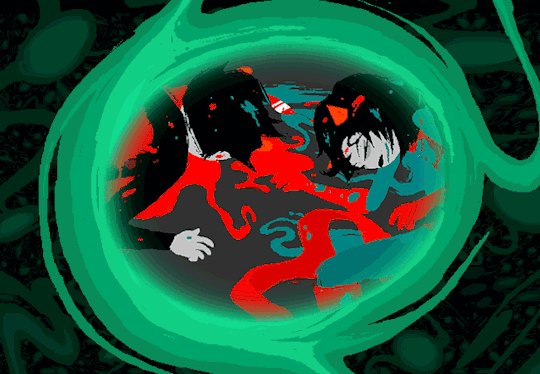
A painful sacrifice is needed to be able to go forward, a reality in which most of them survive and has a chance of winning the game. A necessarily path that she regretted.
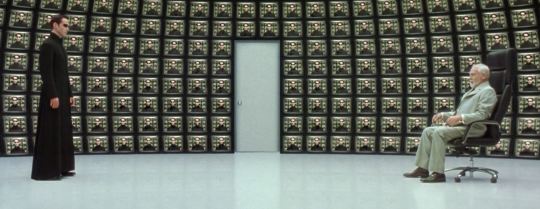
Neo with the Architect in the secret room, the screens displaying the different paths his reactions could take (Matrix: Reloaded, second movie)
In Matrix, Neo has to reach the source of all the program to reinstall the previous version of the code. The first time, he has a small range of opportunity, only a few minutes gap to access a secret room that would allow him to reach the source, among the city of machines. There, he encounters the Architect, a program whom function and personality is based on the creator of the Matrix, and have a chat with him.
Six others chosen ones preceded him, and all failed to accomplished this mission.
Why? “Choice. The problem is choice” answers Neo.
Because unlike the Architect, Neo is a flawed human being. He can’t just brush off his feelings, he’s in love with Trinity. The latter despite asked not to join him plugged herself back into the Matrix allowing him to get safely into the secret room. With that, she exposed herself to an inevitable death. And so Neo took the door that lead to his lover, enabling within him a miracle that resurrected Trinity.
Here was a couple of paragraphs about the dance between duty and love, cold logic and passion.
I’ll continue with the Heart aspect:
I talked about love and romance until now, but let’s take a look at another side of the Heart. The identity.
After taking the red pill- Neo turns his head and gaze at a mirror.
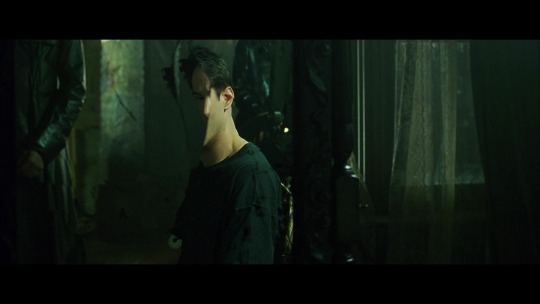
It’s shattered. The symbolism here shows that he’s lacking a part of himself, something that scratch him without being able to put his finger on it. Soon, right before his eyes, the mirror mends itself. Because he chosen the truth, the path that would lead him to understand and find himself.
The mirror is of course, a reference and call back to Alice, mentioned shortly before by Morpheus. No no, please forget about any cartoon, especially Disney’s version of the story. And focus about the sequel book: “Through the Looking-Glass, and What Alice Found There”. It’s a curious, deep and tricky book. I would know, I read it twice and I’m still confused.
But I’m sure of one thing, the adventures of Alice has always been about introspection. First in chapter 1, Alice imagines for fun that the mirror in the living room lead to a parallel world. Like Neo, she touches the mirror and engages into a journey. In chapter 3, in order to cross a giant life-sized chess board (UH HMMMM UNCANNY!) she takes a train.
“There she forgets all nouns, including her own name. With the help of a fawn who has also forgotten his identity, she makes it to the other side, where they both remember everything. Realizing that he is a fawn, she is a human, and that fawns are afraid of humans, it runs off (to Alice's frustration).”
Source: Through the Looking-glass (wikipedia)
[going through the book itself would have been too long]
The train might symbolize the course of life, or a part of it, in which an identity crisis occurs for Alice and question what is and what does it means. I’ll even say that this temporary memory loss put aside all differences and precedences, perhaps reflecting a class hierarchy, between Alice the human and the fawn, or the rich lady and the poor.
Back to Matrix.
Later in the movie, our programmer encounters a woman called the Oracle. She can see some events according to her grasp on human psychology, but never beyond a choice that she cannot understand, not even hers. The Oracle isn’t here to predict the future (even if she can), but to assist and guide those who picked the red pill.
She does sound like a Seer of Mind :]
Upon meeting her, she asks him “do you think you are the one?” to what he respond “honestly I don’t know”. She then point behind him, toward a mantra hanged above the threshold: Temet nosce, which means “know thyself”.
The introspection will continue through all three movies, a wild tango between certitude and doubts, self that leads to a choice, from a choice which leads to who he is, the two are intertwined and indivisible.
In Matrix: Revolution (third movie), the final battle between our protagonist and his alter ego take place. Rain is pouring, thousand and thousand of copies looking down at him, the sky is dark, and Agent Smith step away from the crowd, so the fight begins.
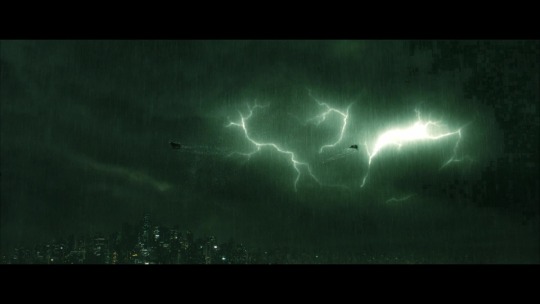
Remember the paragraph about the lightning? The sky in this scene is quite reminiscent to Terezi Land’s electric atmosphere, and even more Dirk’s, has his planet is covered be countless empty green buildings in ruins.
The scene portraits perfectly the confrontation between order and chaos, good and evil, selfless and selfish.
I could go on and on but I think y’all got the concept, and I nicely fill an even bigger word quota, with the two aspects balanced.
Source for the screenshots: Fancaps.net, here and here
Mind-bound recommended Lyricstuck: Dog days are over by Florence and the Machine
#Homestuck Universe#HS theory#SBURB aspects#heart aspect#mind aspect#analysis#nepeta leijon#dirk strider#meulin leijon#matrix series#movies#through the looking glass#and what alice found there#book#neo#morpheus#trinity#the oracle
8 notes
·
View notes
Note
1000/10 choice, i love ur analysis. how about other characters like shou, tome and the others? are the adults (reigen, serizawa, etc) like the seventh year while the others are first years?? and how does magic collides with psychic power here? i mean does it equal magic? (therefore reigen and tome are muggles??) or is sth aside from it, like an extra ability???? (sorry i got excited)
More Sorting
Kurata Tome
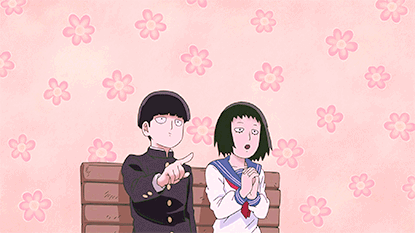
Tome is brash and messy, but she is passionate in her interests and loyal to her friends. While she is certainly the leader of the Telepathy Club and can be ambitious when it comes to persuading Reigen into letting her join his rag-tag team of espers, I would mark it more as persistence. While she lacks any interest in school or doing any actual work, Tome is not afraid of sharing her opinions, and she isn’t cowed by authority or rules.
Because of this, it would be fitting to place Tome into GRYFFINDOR.
Suzuki Shou
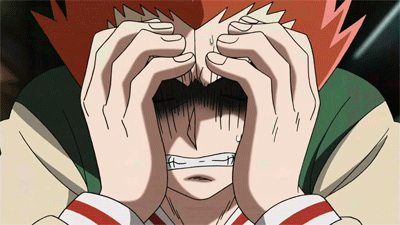
Intimidating when you first meet him, Shou has actually proven to be kind and loving to those he cares about. Through hard work and determination, he has raised his own gang of espers to take down his father, and while not the greatest at remaining calm, his choice to act against his father shows a strong sense of justice. He has refused on more than one occasion to abandon his friends, revealing his loyalty to those he cares for. Plus, he has an affinity for animals.
It’s only fair that Shou is sorted into HUFFLEPUFF.
Serizawa Katsuya
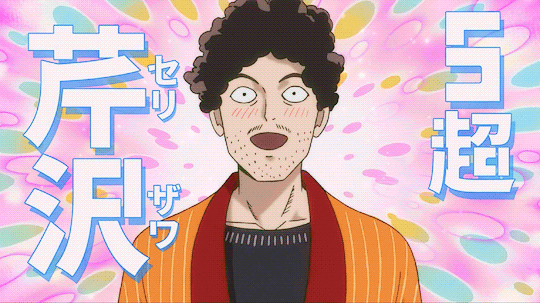
A man tormented by his past, Serizawa is complicated. When you first meet him, he seems to lack courage, as he is often anxious in social settings. But as he grows, he works to protect those that he loves, proving that he has a great deal of bravery. Still, he seems far more patient than most, willing to return back to school and work hard to get good grades. His soft, kind demeanor shows great compassion for people like him, and those who treat him well will quickly gain his trust and loyalty.
For that, Serizawa would not be suited in any better house than HUFFLEPUFF.
((If you would like more people sorted, shoot me another message! For now, because I’ll be answering more in this same ask, I’ll only reserve space for these three characters.))
Adults vs. Children
I would argue that adults such as Serizawa and Shimazaki (Ravenclaw, likely) would already be graduated from Hogwarts, acting out their lives as fully-fledged wizards. So we would imagine a time (likely before or after Harry Potter’s own education) where Serizawa shared classes with his soon-to-be coworkers, all employed by a menacing (and likely dark wizard) Toichiro. In turn, Mob, Teru, Ritsu, and Shou would have similar classes and similar schedules, perhaps with some Ultimate 5 members as their professors.
But one thing is for certain: Reigen is definitely a DADA teacher and definitely Muggle. And absolutely no one knows.
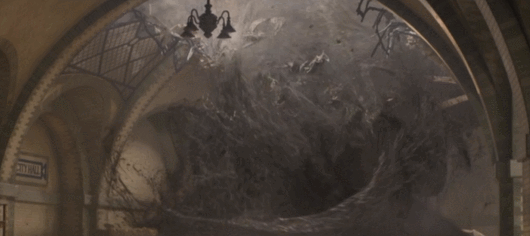
Esper Powers versus Magic
Esper powers are either an additional school of magic (much like charms or potions), or are simply blended into the schools themselves. Transfiguration, for example, would be Mogami’s specialty. Charms would be Shou’s speciality. And so on.
Essentially, the characters would be set in the realm of Harry Potter, and therefore must follow the Harry Potter set of rules, which requires wizards to have wands to cast most, if not all, spells.
Mob, logically, would be an Obscurial since he has worked so hard to hide and repress his magical abilities. And because he’s an Obscurial, he doesn’t necessarily need his wand nearly as much as other wizards. But the consequence is he, of course, goes beserk. And, according to Dumbledore, “an Obscurial can possibly be healed by replacing their feelings of alienation which ultimately created their Obscurus, with a sense of belonging.” So it makes quite a lot of sense.
#and don't worry! this is quite fun#mp100#mob psycho 100#tome kurata#serizawa katsuya#shou suzuki#harry potter#harry potter au#hp au#hp#ravenclaw#hufflepuff#gryffindor#slytherin#spiteful musings#spiteful answers#reigen arataka#shigeo kageyama#mob
30 notes
·
View notes
Text
Mandalorian Characters Sorted into Hogwarts Houses
Just a quick note! This is all just my opinion; I spent a while thinking about it as there were a couple I was unsure on. But ultimately, I feel that the following results are accurate and I can support them. Feel free to share your thoughts though, I'd love to hear them!
Din Djarin:
💛Hufflepuff
Cara Dune:
❤️Gryffindor
Kuiil:
💙Ravenclaw
Greef Carga:
💚Slytherin
Here's why:
Din Djarin
•Hufflepuff/Slytherin
The Mandalorian himself was the one I struggled the most with. He is certainly brave, very sharp, and his ambition to do a job is admirable. But here's why I settled on Hufflepuff. When considering his motivations for saving the Child, it all boiled down to him having compassion on the baby and a desire to adhere to his Mandalorian code concerning foundlings. I felt that we see this compassion and respect for persons several times during the series: training the Blurrg, not dismissing the villagers plea to stay and fight for their land, and communicating peacefully with the Tusken Raiders to pass across the dunes. If he had shown these same actions, but motivated by a desire or a greed, I would have placed him in Slytherin. The other aspect that I took into consideration was his idea of justice. He spared Doctor Pershing, for example, one, because he did not pose any threat, and two, he believed him when he said he saved the Child. We also see this judgement come to pass in Chapter 6, when instead of killing all three of the mercenaries, he simply locked them up to be taken to the New Republic. The only person he harmed in that instance was the droid, because he was threatening the Child. Which brings me to my final argument of why I believe he is a Hufflepuff. He is loyal to the people and ideals that matter most to him. When discovering that there was a great massacre of the coven, he felt a desire and a duty to stay behind and help care for the fallen. When the Child was threatened time and time again, he placed himself in harms way to protect him. Even when his sworn enemy, a droid, sacrificed himself for the good of the company, he resisted because he was indebted to him and wanted to save him as he did. Loyalty to his values, his compassion towards people, and his fair judgements tell me he is a Hufflepuff.
Cara Dune
•Gryffindor/Slytherin
Cara was fairly easy for me to sort. What I wanted to focus on was her motivations and what made her a Gryffindor. When making my notes, the first thing that came to my mind about her was "adrenaline junkie". Even on a peaceful planet where there is no trouble, we see Cara organizing and participating in fights. She craves the rush and the thrill of the danger in a moment, which is part of the reason why she defected from the Rebels. In that same vein, she is hotheaded. It should be noted that stubbornness and hotheadedness are not necessarily Gryffindor traits, but they are very closely tied with pride. Cara believes her opinion to be right, and is difficult for her to change her mind. She never trusted Greef Carga, and she didn't quite until the end of the chapter. She gets furious when the baby almost choked her (rightfully so) but lashes out and insists that something is not right. She also is not afraid to hide who she is, wearing her stripes proudly (literally) and hesitating to cover them up when necessary. But what really sealed the deal for me, and the reason why I believe she is a Gryffindor, is because of how she acts in battle. She is a leader and helped rally the villagers in Chapter 4 when they were terrified. She stood in harms way and provided cover fire for the Mandalorian, knowing full well she could be shot down at any second. And, most importantly, when Din was injured, she immediately pulled him out of the line of fire and tended to him, refusing to leave him behind. That kind of bravery and loyalty is characteristic of a Gryffindor, and should be heralded.
Kuiil
•Ravenclaw/Hufflepuff
For the longest time, I had Kuiil down as a Hufflepuff. I heavily considered his training of IG-11 to be acts of compassion and extreme patience. His willingness to help the Mandalorian at a moments notice and all of the work he did to, one, free himself from slavery, and two, help reassemble Din's ship indicated to me he was a Hufflepuff. But there was just one thing that stopped me from doing so. His pride in his work and his confidence. There can be proud and confident Hufflepuffs, of course, but hear me out. He trusts his work and his abilities more than anything. I was thinking back to when he was telling Din to trust IG-11 because he programmed it, and after all, he trusted him didn't he? Trusting a droid is a lot to ask of a man who has a clear grudge against droids. And yet Kuiil was so confident in his craftsmanship that he didn't really care about the Mandalorian's personal feelings. To him, it was the most logical thing because he knew himself and knew it would be good. And therein lies the key, the reason why Kuiil is a Ravenclaw. He is only motivated by things that make sense to him or is the most logical move. He helps Din because he knows it will bring peace to his valley. He restores IG-11 because he knew it would useful to have a droid to help him. He worked three lifetimes to free himself from slavery because he knew there was no other way. Kuiil above all else trusts himself and his intellect. That's why he built the new cradle for the baby. He wanted to prove to the others that his workmanship was perfect, it's almost like he couldn't stand the idea that they thought it was anything less than perfect. He values his intelligence and trusts himself to make all the right decisions because he knows, in his long life, that he has seen enough of the worlds to know the only thing he could trust in was himself. He is a very Hufflepuffy Ravenclaw.
Greef Carga
•Slytherin/Ravenclaw
There's not much that needs to be said about this decision. I pretty much knew he was a Slytherin right away. Slytherins are defined by their cunning and ambition. Greef, on several accounts, used sly methods to achieve his goals. He hid in the Mandalorian's ship to trap him, he attempted to double cross Din to retrieve the asset, and he did everything necessary to remove the Empire, who was interfering with his business. The entire time, he is motivated by his own personal gain. He wants the Mandalorian and the Child for the reward and to maintain the Guild's reputation so people would pay his rates. He agrees to work with Din and Cara when he sees they were his best chance at eliminating the Empire. And, in the end, he tries to sweet talk Din and Cara into working with him again so that his operations can run smoothly. He double crosses the other bounty hunters that he was going to use to double cross Din and Cara because he has his own moral code that he adheres to and honors. The Child saved his life, so he will save theirs, a debt is a debt. Everything he does has a cost-benefit pattern, as he is a businessman. As I alluded to before previously, he is willing to lie to get his way, lying to the Mandalorian to get him to return, lying to him when he assigned him the bounty in the first place, lying to him about the state of the city and how many troopers there were. To him, his priorities are himself, and yet he sticks to the rules that he has sworn to adhere to, making him, somehow, a dishonorable respectable man.
In summary:
💛Din Djarin is motivated by his personal values he cares about
❤️Cara Dune is motivated by her self interest and yet desire to do something worthwhile
💙Kuiil is motivated to make the most logical decisions that make sense to him
💚Greef Carga is motivated by his business and desire to be successful
If you made it thus far, thank you so much for reading! I put a lot of thought into these decisions and I am happy with the outcome. If you have any sort of opinions, please, let me know! I would love to discuss them with you!
Question for you guys! Sort some of these characters:
Baby Yoda
IG-11
Doctor Pershing
Omera
The Client
Moff Gideon
The Armorer
#Mandalorian#the mandalorian#din djarin#cara dune#kuiil#greef carga#baby yoda#mandalorian thoughts#star wars#houses#star wars hogwarts houses#mandalorian hogwarts houses#Gryffindor#Hufflepuff#Ravenclaw#Slytherin#harry potter#this is the way#I have spoken#I spend a lot of time on this#too much time#it's literally past midnight#please validate me
22 notes
·
View notes
Text
My Classpect
Uhhhhh so I self-identify as a Sylph of Mind, and communistvriska’s awesome classpect tests identified me as a Page of Blood. (Here are the links: class aspect) I find both to be fitting for wildly different reasons. So I’m basically just gonna vent about who I am as a person and translate that into Homestuck lingo. This is how I spend my weekends nowadays. I have no life. :3
I’ll just preface this with a little reminder. Humans are complex beings. We rarely, if ever, have an identifiable character arc. That’s what a classpect defines. So even the simplest of humans, or the least-developed of characters, might fit into more than one classpect. We cannot be categorized without being simplified. So remember that there is more to a character, and more to me, than just how one’s arc progresses.
Gonna start by giving my reasoning behind my self-identified classpect. I have the Mind aspect because I find that to be the aspect that resonates the most strongly with me. I know this isn’t necessarily a perfect way to pick your aspect, but it works for me. As I see it, Mind is strongly linked to the concept of ideas, and with metacognition, in a sense. Mind is also strongly linked to logos and logic. I am strongly drawn towards ideas, as evidenced by my love of knowledge and fan-theories and creating new concepts and new universes. I also seek out logos in order to understand the world (at the exclusion of all else, I’ll admit). Mind is the lens through which I view the world, and the tool via which I attempt to understand it. It is the aspect in which I feel the most at home. I love being alone with my thoughts. Oh yeah, and it was also the aspect I got on the official test.
But my aspect is not without its detriments. My own mind is broken, in a sense. I have been diagnosed with depression, an illness of the mind. Sometimes, it seems like my mind is my enemy. Not even my last refuge, my most sacrosanct dwelling, my inner home, is safe. I hate that.
So the reason why I identify as a Sylph of Mind is twofold. The first one is a rather literal interpretation. My mind is in need of healing. I wish to heal it myself. A Sylph is what I must become in order to achieve that.
The second one is more metaphorical. I feel like a Sylph is one who has a powerful urge to have more of, or be more connected to, one’s aspect. Kanaya has a powerful urge to create new things (fashion and such) and bring about new life. Both are facets of Space. Aranea, in my opinion, has a powerful urge to know more, hence why she so loves to exposit and share her knowledge, and to be more important to the narrative, hence why she does some hijacking and whatnot in Act 6-6. This seems like more of a Thief’s domain, but I don’t think a Sylph tends to go about satisfying such urges in such active ways. (Unless you’re Aranea and you like mind-controlling people to stab each other and themselves.)
I have an urge to be more connected to Mind. I seek to be more logical (at the expense of pathos and ethos), and I seek to come up with new ideas and to use ideas in new ways, that sort of thing, via my writing and art. In addition, my goal in life is to inspire others to create, to come up with their own ideas, to think about things and create things about their thoughts. Everyone has a story. I have a story. I have many stories. I want to share them. I was inspired to share my stories because of all those who have come before me and shared their own stories: Tolkien, Hugh Howey, those dudes on FFN who write TLH fics. And I want other people to be able to see my stories and thereby be inspired to make and share their own. Ideas are meant to be shared. They’re worth sharing, no matter how lowly. Because ideas gain their power from being shared. The most lasting concepts, in philosophy, in science, in art, are the ones that have reached the most people. But you can’t have a great idea if you don’t start with a small one. Small ideas can grow, like a snowball rolling down a snowy hill. They pick up contributors and momentum, and they become great powerful icy boulders capable of enacting change upon the terrain. But you can’t enact that change if you don’t start with a little snowball, and let it go. Some of them peter out, yes. But not all. It’s always worth a shot. Because even the smallest of snowballs still make a bit of change in the terrain. Perhaps it’s just a couple grains of dirt moved. But it’s still a change. And you can’t make a change if you don’t let that snowball go.
Okay, so that developed into a tangential metaphor. Heck with it. That’s how I feel about ideas. I should say it. I want to foster the growth of ideas, through my example and my encouragement. That is my goal in life. And that, in my opinion, is what makes me a Sylph of Mind.
The role of Page of Blood, though, I think fits me, too, when I look at both pieces together. Separately, I didn’t really think they made too much sense. But after looking at both in combination, I find the classpect fitting. And a classpect is more than the sum of its parts, in truth.
I hate Blood. Not, like, blood itself, I am in no way squeamish. I hate the aspect Blood because it’s about bonds. As an introvert, I am rather opposed to the notion of people in general. But bonds? Bonds are what mean my life has meaning. Bonds are what keep me grounded and tied to others. Bonds are what I would wish away in an instant so that I might die having left no impact on others. It’s like that movie, what’s it called, It’s a Wonderful Life. If an angel came to me and granted me a wish, I would wish that I had never been born. I would wish that I had never existed. I hate the bonds that keep me here because they keep me here. I hate them because why would anyone want to keep bonds with me? Why?
Wow okay that got raw. I’m doing okay you guys, srsly
And yet, I am also very connected to Blood, too. Because Blood is about ethics and doing the right thing. Mind is tied to logos, and Blood is tied to ethos. I have a very strong moral compass. I am very much a rule-follower. I hold firm to rules, and to right and wrong, in all situations. I am very much Lawful Neutral in that regard. This could make me Mind, too, because Mind does have a lot to do with right and wrong, but Mind is more about objective right and wrong, and Blood is more about subjective right and wrong, imo. I have a tough time with subjectives, with moral shades of grey, though I try to uphold the right in all situations.
Anyway. I also know this about myself. I care deeply. I care deeply about others. I care deeply about doing the right thing. I know that, if I allowed myself to, I might be one of the most caring people this side of Jupiter. Maybe. I could love, and care, if the concept wasn’t so... frightening? Revulsive? Confusing?
I’m holding myself back. My Mind is doing it. But, I have to wonder, if I let myself tap into ethos and pathos, what would it do? I would rather stick with what I know. And so I will wait, and remain with the logos, and keep to the rational, so that the current of Blood doesn’t sweep me away. It might root me. It might. But I am in fear of it, even though it is a part of me. And that, I think, is why I could also be a Page of Blood.
4 notes
·
View notes
Text
She-Ra and the Inherently Good Protagonist
I absolutely love She-Ra and the Princesses of Power, but there’s something that’s been bothering me for a long time. I’m talking about the Horde lying to Adora and the rest of the recruits about their true mission and the war and about the rebels/resistance. Logically, there is no reason whatsoever for them to do that. Why would you lie to your soldiers about something that they are going to see first hand soon enough in the field and know it’s a lie? Not only that, but as we see throughout the show, most members of the Horde do know the truth or, like Catra, don’t particularly care about it when they find out. So why lie in the first place?
(Long-ass meta ahead; some spoilers for She-Ra and the Princesses of Power, Carmen Sandiego, Captain Marvel, Avatar: The Last Airbender, and The Force Awakens)
Unfortunately, the only conceivable reason for it is to make Adora redeemable. Because Adora didn’t know, she thought the rebels were evil, she thought she was on the good side. And that way, once faced with the truth, she would so very easily and very quickly be able with little to no regret or fight to join the real good side.
Now, this is unfortunately something that I’m seeing more and more. Carmen in the new Carmen Sandiego remake has a similar story. Captain Marvel has it too. In all these stories there is an element of authoritarian organizations lying to the protagonist (or even to all member of the organization like in Carmen) about their true nature, which enables said protagonist to defect once realizing the truth. Another important element in these stories, which goes to make the lying part all the more absurd, is the immersion of the protagonist in the culture and environment of the authoritarian organization and the protagonists relative isolation from any member of the extraneous groups they work against.
The protagonists know only life within the moral borders of the cultures they live in. Both Carmen and Adora were raised from infancy by evil organizations in enclosed areas that consists only members of those organizations. They had no prior cultural references with which they had to battle with, they were a clean slate to be molded into the perfect members of their respective societies (thieves and general evil doers for profit in the first case and conquerors in the second). In the case of Carol Danvers it’s a little more complicated, since she wan’t born into the Kree. Her memories were pretty much erased but I am not exactly sure how much of her personality and moral compass were intact after they took her. But either way, at that point of her life she was Kree. Kree life was the only thing she knew (anyone who knows better is welcome to correct me on this). She is also unique in that she is the only one who is being lied to, as opposed to Adora and Carmen, so I’m including her here with a major asterisk as her story has both glaring similarities and important differences that should be taken into account.
I have written about this issue in Carmen before. Back then I said: “there isn’t a single logical reason for an entire criminal organization to lie to everyone of its recruits only to reveal to them at the end that they aren’t evil, they are EXTRA evil”, and it applies to She-Ra as well. If everyone in, let’s call it, “active duty” is well aware of the truth (they are hurting people for profit/they are conquering the planet and killing innocent people/they just don’t like that specific alien race? Honestly I’m not sure I understood what the Kree wanted...), there is no reason for them not to tell their members the truth from the beginning. Since it doesn’t serve the organizations at all, again it leads us to the understanding that it’s only there For The Plot, which is... not the best writing.
There is one thing I can say in favor of this plot device. For that I’ll need to talk about another show - you guessed it - Avatar the Last Airbender. Zuko might be the greatest and most cohesive example of a villain learning the truth about the actions of their side of the war and choosing to defect and help bring it down. The thing is, this process took him two and a half seasons out of the three the show had. I guess we can’t really expect a show called She-Ra or a show called Carmen to take more than two seasons before the protagonists after which the shows are called realize they might be on the wrong side, and this device is very effective in order to jump start the actual plot.
Now, I say “guess” because honestly, that kind of a show would have been fascinating to watch and because it leads me to the most problematic aspect of this plot device; Even though they were raised/nurtured by villainous people, Adora, Carmen and Carol are somehow morally superior to all those around them and are capable of discerning right from wrong even though no one thought them that distinction for absolutely no reason at all besides them being the heroes of the story. Like I said about Carmen: “Instead of making it a process of growth and understanding the consequences of her actions, she is just inherently good and better than anyone around her because of Reasons and plot convenience”. (I would throw in Finn from the Star Wars sequels here as well, but very carefully. He also has many similarities to this plot line - being raised from infancy in a racist authoritarian dictatorship. But even though I love him very much, I still don’t really understand the reason for his defection in TFA - I think he just didn’t want to die? His struggle to do the right thing in the first movie distinguishes him from Adora, Carmen and Carol, but on the other hand he isn’t a part of the evil forces at all from pretty much the minute we meet him, so he doesn’t exactly fit this mold, though it’s an interesting comparison)
This sort of notion is not only an easy trick to make us care about these characters, but it’s a very dangerous and toxic idea that implies that some people are inherently good and others are inherently evil. It ignores the intricate way in which all of us are victims of propaganda, some of which could take years to even notice exist. Nearing 30, I, a woman living in a democratic relatively western country, still find new ways in which misogyny is so ingrained into me by decades of socialization, consumerism and education. To think that a person who lives in an isolated racist dictatorship would have some magic immunity to all its propaganda, and that the process of getting out of these dark dark paces isn’t full of obstacles and doubts and mistakes is distorting our perception about real people in similar situations going through this process right now.
Going back to Zuko’s example, you could say that the fact he wasn’t the protagonist at all but the antagonist in the first season is what enabled him to have a much more rounded process of changing sides and gave him the time to change and grow. But, like I said, watching the protagonist of a show go though this process of unlearning propaganda could be amazing to watch. But the thing I love most about Zuko’s story is that he isn’t inherently good. Sure, he has always been compassionate and values life (at least those of his own people), but his morality wasn’t superior to every single one of his nation. He was arrogant, aggressive, and was not at all ignorant to the actions of the Fire Nation (though maybe he didn’t fully understand their consequences). He truly believed his people are better, and that by their conquest they are making the world better. Whether he particularly cared about the second part is not important. What is important is that while he was fed this propaganda all his life, he wasn’t clueless as to the violent nature of his own and his nation’s actions. What he did learn along the way was that “better” is not an objective definition, and that instead of being “grateful” everyone hated the Fire Nation for the suffering they bring and that maybe war is not the best course of action. He learned that by meeting these people, his enemies, and experiencing their lives.
Adora, Carmen and Carol have these moments too (and they are wonderful) of coming close to their enemies and understanding them (it’s not exactly enemies in Carmen’s case but the general population of the world I guess..,). But it acts more as a shorthand for an actual process and because of the lies they have been fed and their “inherent goodness” they have little to no struggle to renounce their former ways and quickly jump ship and join the opposing forces. Zuko, on the other hand, struggles. Oh, lord, he struggles. He steals from the first person who shows him compassion. He joins forces with “good” people (as much as you can call Jet good) out of necessity or simply for selfish reasons. He struggles and fails and relapses and makes mistakes upon mistakes upon mistakes before he is able to move forward. And even then he makes more mistakes. He is bad at being good because no one taught him how to be good, so he has to learn it almost from scratch and that’s what makes it worth it. It makes it seem like it’s achievable, like it’s something that could happen in real life. It’s not necessarily perfect, but it’s better.
I am not saying that She-Ra doesn’t have much more nuance than that. We see how Catra struggles with her choices, the confusion and abuse that pushes her again and again further into the dark. The same goes to the other shows and movies. What I am saying is that this specific plot device on it’s own about an ignorant protagonist being lied to for no in-story logical reason besides enabling them to easily change sides has a very toxic and dangerous side that we need to pay attention to.
#she-ra#she-ra and the princesses of power#catra#adora#satpop#satpop meta#carol danvers#Captain Marvel#marvel#marvel meta#atla#avatar the last airbender#atla meta#zuko#finn#star wars#star wars sequels#the force awakens#sw#sw meta#carmen santiago#carmen sandeigo netflix#carmen sandeigo 2019#carmen sandiego meta#things that i should be doing:#working on my final project for school#catching up on material for my new job starting this Sunday#things that i am doing:#writing a 1700 word essay on she-ra#day well spent
50 notes
·
View notes
Text
MDZS meets MBTI
The Myers-Briggs Personality type is older than the Enneagram, and consists of sixteen types based on four different pairs of personality traits: Introversion vs. Extroversion; Sensing vs. Intuition, Feeling vs. Thinking, and Perceiving vs. Judging. To be clear, none of these categories are black and white–for example, all Feelers are capable of using logic, and Thinkers have feelings and care about people–but it’s a cool way of understanding personalities.
I’m not going to do every character, but simply the characters I think are most important and the ones for whom I have the most information to analyze (some is def guesswork). :P Also, this is just my opinion and definitely open to debate! MBTI isn’t a science; it’s just something I do for fun.
Wei WuXian-->ENFP “The Campaigner”

Unlike many of the others, Wei WuXian’s type seems very, very obvious. He might be the most ENFP to ever ENFP.
The ENFP personality is a true free spirit. They are often the life of the party, but unlike Explorers, they are less interested in the sheer excitement and pleasure of the moment than they are in enjoying the social and emotional connections they make with others. Charming, independent, energetic and compassionate... if they’ve found a cause that sparks their imagination, ENFPs will bring an energy that oftentimes thrusts them into the spotlight, held up by their peers as a leader and a guru – but this isn’t always where independence-loving ENFPs want to be.
Lan WangJi-->ISTJ “The Logistician”
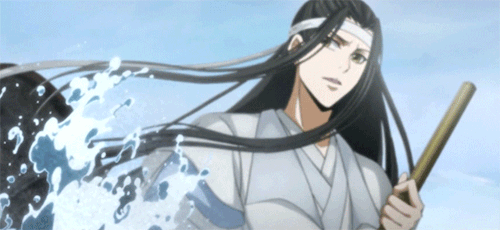
Why yes, Lan WangJi is the exact opposite of his beloved Wei WuXian. He’s another one that seems pretty obvious to me.
ISTJ personalities are no-nonsense... ISTJs have little tolerance for indecisiveness, but lose patience even more quickly if their chosen course is challenged with impractical theories, especially if they ignore key details...
ISTJ personalities adhere to established rules and guidelines regardless of cost, reporting their own mistakes and telling the truth even when the consequences for doing so could be disastrous. To ISTJs, honesty is far more important than emotional considerations, and their blunt approach leaves others with the false impression that ISTJs are cold, or even robotic. People with this type may struggle to express emotion or affection outwardly, but the suggestion that they don’t feel, or worse have no personality at all, is deeply hurtful.
Jiang Cheng-->ISTJ “The Logistician”
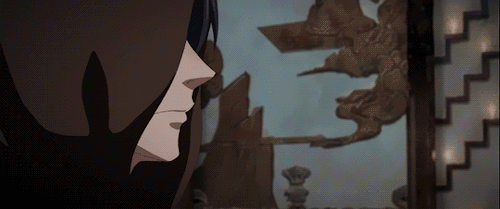
Yes, the same type as Lan WangJi, just a tad more bitter. Personality tests, even if two people seem to fit a type extremely well, can’t define someone, because people are just so infinitely more complex. The part about being taken advantage of reminds me here of how Jin GuangYao points out that people took advantage of Jiang Cheng’s need to prove himself to drive a wedge between him and Wei WuXian.
ISTJs’ dedication is an excellent quality, allowing them to accomplish much, but it is also a core weakness that less scrupulous individuals take advantage of. ISTJs seek stability and security, considering it their duty to maintain a smooth operation, and they may find that their coworkers and significant others shift their responsibilities onto them, knowing that they will always take up the slack. ISTJs tend to keep their opinions to themselves and let the facts do the talking, but it can be a long time before observable evidence tells the whole story.
Lan XiChen-->ENFJ “The Protagonist”

Sadly, this description is pretty accurate to Lan XiChen’s strengths and also his flaws--in particular in terms of his relationship with Jin GuangYao.
ENFJs radiate authenticity, concern and altruism, unafraid to stand up and speak when they feel something needs to be said. They find it natural and easy to communicate with others, especially in person, and their Intuitive (N) trait helps people with the ENFJ personality type to reach every mind, be it through facts and logic or raw emotion. ENFJs easily see people’s motivations and seemingly disconnected events, and are able to bring these ideas together and communicate them as a common goal with an eloquence that is nothing short of mesmerizing.
The interest ENFJs have in others is genuine, almost to a fault – when they believe in someone, they can become too involved in the other person’s problems, place too much trust in them.
Jin GuangYao-->ESFJ (?) “The Consul”
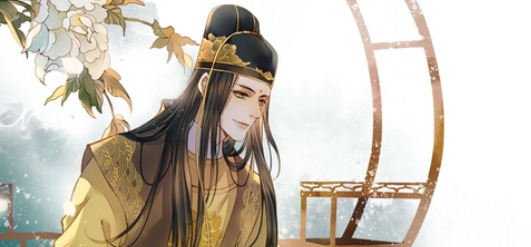
This one I’m less certain of--FJ seems certain to me, but I/E and N/S is a bit debatable. I think he best meets the description of “the Consul” though.
ESFJs are more concerned with fashion and their appearance, their social status and the standings of other people... ESFJs love to be of service, enjoying any role that allows them to participate in a meaningful way, so long as they know that they are valued and appreciated. Coming to terms with their sensitivity is ESFJs’ biggest challenge – people are going to disagree and they’re going to criticize, and while it hurts, it’s just a part of life.
Nie MingJue-->ESTJ “The Executive”
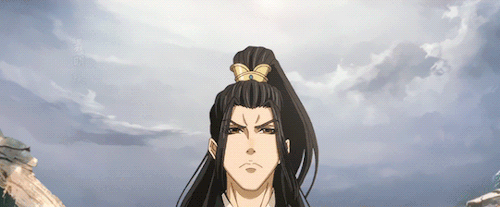
Less certain of E or I than for the other three, but the way he failed to overcome the challenge of how not everyone processes the same way seems very ESTJ to me.
ESTJs are representatives of tradition and order, utilizing their understanding of what is right, wrong and socially acceptable to bring families and communities together. Embracing the values of honesty, dedication and dignity, people with the ESTJ personality type are valued for their clear advice and guidance, and they happily lead the way on difficult paths.
ESTJs are aware of their surroundings and live in a world of clear, verifiable facts – the surety of their knowledge means that even against heavy resistance, they stick to their principles and push an unclouded vision of what is and is not acceptable... they expect their reliability and work ethic to be reciprocated – people with this personality type meet their promises, and if partners or subordinates jeopardize them through incompetence or laziness, or worse still, dishonesty, they do not hesitate to show their wrath...
The main challenge for ESTJs is to recognize that not everyone follows the same path or contributes in the same way.
Nie HuaiSang-->ISFP “The Adventurer”

Interesting name for a timid HuaiSang, but I really do think he is an ISFP. He is notably one of the few Nie Sect leaders who doesn’t seem at risk of dying from a qi deviation, and hence his less brutish way of ruling might actually, in the long run, be good for his sect. (NMJ would be proud... maybe.)
ISFP personality types are true artists, but not necessarily in the typical sense where they’re out painting happy little trees. Often enough though, they are perfectly capable of this. Rather, it’s that they use aesthetics, design and even their choices and actions to push the limits of social convention...
If these goals and principles are noble, ISFPs can act with amazing charity and selflessness – but it can also happen that people with the ISFP personality type establish a more self-centered identity, acting with selfishness, manipulation and egoism.
Wen Qing-->ENTJ “The Commander”
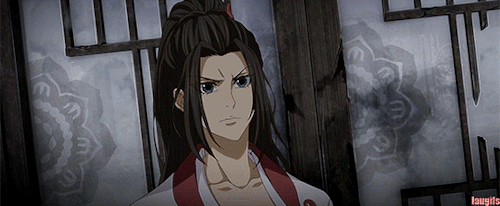
Another one I feel fairly confident in. Wen Qing is a boss queen who gives birth to one of the series’ most iconic lines: “thank you, and I’m sorry.” She’s able to win the respect of Wen RouHan and even some people who hate the Wens, and thinks outside the box, theorizing on core transfer but hesitant to actually try it when she isn’t fully confident.
ENTJs are natural-born leaders. People with this personality type embody the gifts of charisma and confidence, and project authority in a way that draws crowds together behind a common goal. But unlike their Feeling (F) counterpart, ENTJs are characterized by an often ruthless level of rationality, using their drive, determination and sharp minds to achieve whatever end they’ve set for themselves.
Wen Ning-->INFP “The Mediator”
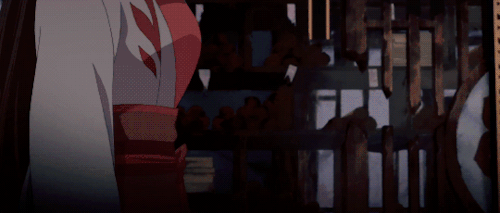
I was torn between S and N, but I went with INFP because he is more focused on thinking about possibilities--in fact his arc is about learning to be confident in his own possibilities and to explore them.
INFP personalities are true idealists, always looking for the hint of good in even the worst of people and events, searching for ways to make things better. While they may be perceived as calm, reserved, or even shy, INFPs have an inner flame and passion that can truly shine.
Jin ZiXuan--> ESTP, “The Entrepreneur”
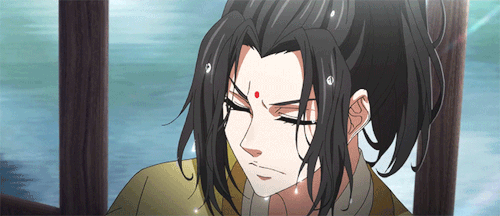
Does he have enough of a personality for me to really analyze him? Maybe not but I like him a lot. He is motivated by what seems like pride at the beginning, but we later realize he cares deeply about the people around him and genuinely cared for Wei WuXian because his wife did.
Inspiring, convincing and colorful, they are natural group leaders, pulling everyone along the path less traveled, bringing life and excitement everywhere they go. Putting these qualities to a constructive and rewarding end is Entrepreneurs’ true challenge.
Jiang YanLi-->INFP “The Mediator”
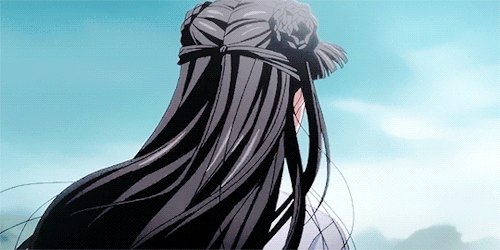
Shijie was indeed the mediator between her two brothers, and it’s her legacy of love and kindness, of wanting Wei WuXian to live even at the expense of her own life no matter what he’d done, that makes a huge difference.
Luckily, like the flowers in spring, INFP’s affection, creativity, altruism and idealism will always come back, rewarding them and those they love perhaps not with logic and utility, but with a world view that inspires compassion, kindness and beauty wherever they go.
Jin Ling-->ESTP, “The Entrepreneur”
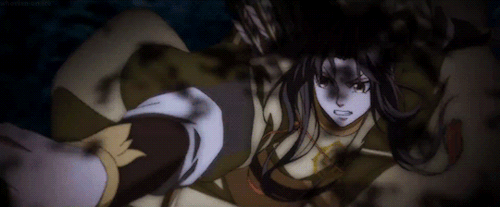
Jin Ling is the hardest one to pin down and I’m mad because he’s one of my favorites. He is highly emotional, but I think he’s an ESTP like his dad.
Entrepreneurs keep their conversation energetic, with a good dose of intelligence, but they like to talk about what is – or better yet, to just go out and do it. Entrepreneurs leap before they look, fixing their mistakes as they go, rather than sitting idle, preparing contingencies and escape clauses.
Lan SiZhui-->INFJ “The Advocate”
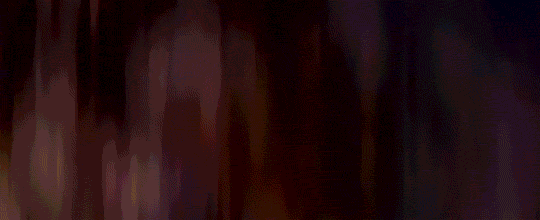
My type.
INFJs indeed share a unique combination of traits: though soft-spoken, they have very strong opinions and will fight tirelessly for an idea they believe in. They are decisive and strong-willed, but will rarely use that energy for personal gain – INFJs will act with creativity, imagination, conviction and sensitivity not to create advantage, but to create balance.
Lan JingYi-->ESFP “The Entertainer”
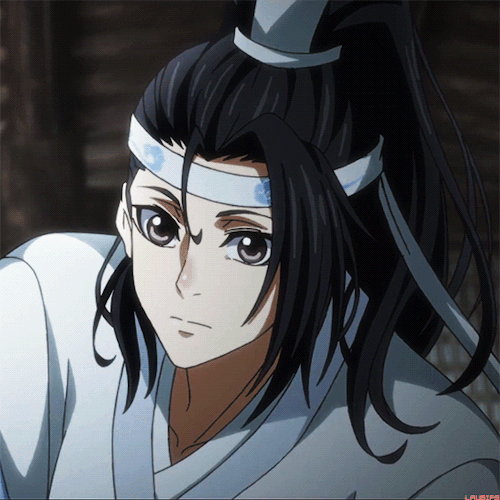
He’s pretty easy to figure out. I constantly wonder how he fares in the Gusu Lan Sect.
...they love putting on a show for their friends too, chatting with a unique and earthy wit, soaking up attention and making every outing feel a bit like a party. Utterly social, ESFPs enjoy the simplest things, and there’s no greater joy for them than just having fun with a good group of friends.
Xue Yang-->ESTP “The Entrepreneur”
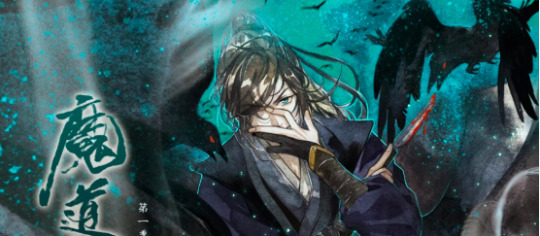
ESTPs are the likeliest personality type to make a lifestyle of risky behavior. They live in the moment and dive into the action – they are the eye of the storm. People with the ESTP personality type enjoy drama, passion, and pleasure, not for emotional thrills, but because it’s so stimulating to their logical minds. They are forced to make critical decisions based on factual, immediate reality in a process of rapid-fire rational stimulus response.
A-Qing-->ESTP “The Entrepreneur”
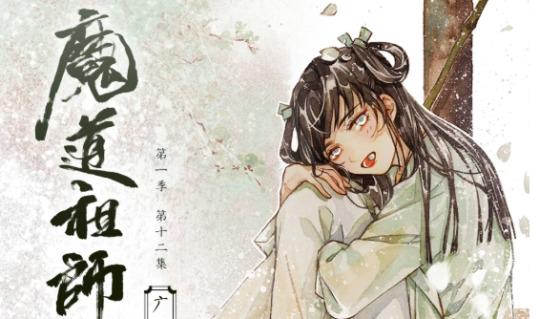
Yes, I think A-Qing is the same type as Xue Yang, which doesn’t surprise me because they are actually extremely blatant foils in the story. It’s funny the description notes how observant ESTPs tend to be, because that’s something A-Qing absolutely is, noticing Xue Yang’s minuscule changes in expression and keeping her from trusting him, and Xue Yang is also incredibly observant of her words to realize she might just not be blind after all.
With perhaps the most perceptive, unfiltered view of any type, ESTPs have a unique skill in noticing small changes. Whether a shift in facial expression, a new clothing style, or a broken habit, people with this personality type pick up on hidden thoughts and motives where most types would be lucky to pick up anything specific at all. ESTPs use these observations immediately, calling out the change and asking questions, often with little regard for sensitivity. ESTPs should remember that not everyone wants their secrets and decisions broadcast.
Xiao XingChen-->ISFJ “The Defender”
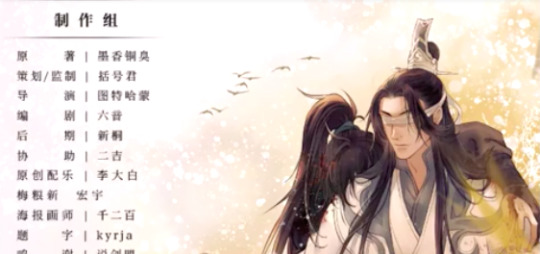
The following description really reminds me of XXC especially after he hears the story about Xue Yang’s love of candy as a child, and every single day thereafter buys him and A-Qing a candy.
ISFJs take their responsibilities personally, consistently going above and beyond, doing everything they can to exceed expectations and delight others, at work and at home... Naturally social, an odd quality for Introverts, ISFJs utilize excellent memories not to retain data and trivia, but to remember people, and details about their lives. When it comes to gift-giving, ISFJs have no equal, using their imagination and natural sensitivity to express their generosity in ways that touch the hearts of their recipients
Song Lan-->INTJ “The Architect”
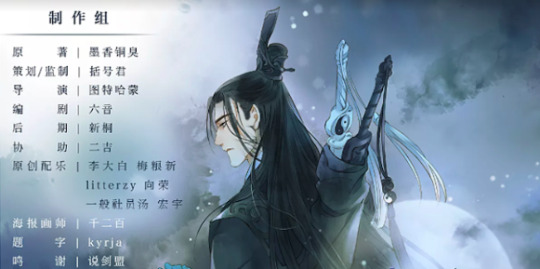
There’s not as much to go on for Song Lan, but what we do have seems to suggest INTJ to me, particularly in how someone who would spend years looking for a friend would refuse to consider that Xue Yang might have changed at all.
INTJs are simultaneously the most starry-eyed idealists and the bitterest of cynics, a seemingly impossible conflict.
Yu ZiYuan-->ESTJ “The Executive”
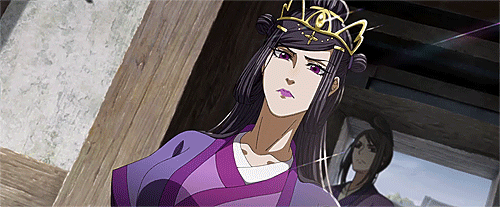
Welp. The Purple Spider is definitely an Executive.
ESTJs are representatives of tradition and order, utilizing their understanding of what is right, wrong and socially acceptable to bring families and communities together. Embracing the values of honesty, dedication and dignity, people with the ESTJ personality type are valued for their clear advice and guidance, and they happily lead the way on difficult paths.
124 notes
·
View notes